










If you had beef with last week’s issue, chances are you weren’t the only one. While the editorial team were preoccupied making sure the drugs content of the Drugs Issue was spic and span and we didn’t accidentally nark on a dealer or out someone for a drug habit – well, except for ourselves – the rest of the mag was riddled with more mistakes than your borer-beetled hardwood floor.
Early last week my vibe was that of a cancel-cultured celebrity sitting in my beige-andboring-guys-I’m-so-down-to-earth room before a camera, no make-up, eyes red, and making the following apologies and corrections:
Correction 1: The centrefold was uncredited. The lovely Carina Page worked incredibly hard on the Drugs Issue centrefold and deserved to get her flowers for it.
Correction 2: The UniPol article was framed in a way that completely undermined the work of staff there to make it an inclusive environment for every student, not just the gym bros who felt inconvenienced by their dumbbells being in a different place. That is to say it sorely lacked the balance it needed.
Correction 3: The Student Support article had multiple factual inaccuracies and implied that the previous Queer Support Coordinator was absent in her duties, an untrue and unfair framing that was completely unintentional. The article was about an out of date website – plain and simple. The online version has been removed.
Correction 4: We somehow reported on a Market Day that didn’t happen? This one was completely on me. Harry, one of our volunteers, pitched a news article about an upcoming market day. When it was passed over to me for editing, I misunderstood and thought it was about one that had already happened and I’d missed because of being glued to my office chair or attending meetings. So uh, yeah. My bad.
The online articles have been amended to correct these mistakes and I’ve made personal apologies to those impacted. While the online versions of articles are more or less the enduring record of Critic since we only print 3,000 physical copies of the magazine per week, going back to correct errors is obviously something that we try to avoid.
Our editorial process includes multiple layers of checking and re-checking to catch those sorts of things. Ultimately, if anything falls through the cracks it’s on me – especially if I was the one to write or add the fuck-ups.
But that’s a very important part of Critic: eating humble pie when we need to. We act as a fourth estate – like a “watch dog” for those who haven’t taken MFCO103, an important part of a healthy democracy. Democracy means transparency, openness, and a willingness to criticise in the name of the greater good. It also means being criticised right back.
Every week, the Critters fan out across campus with glee to point fingers, prod, ask questions, and generally put feet to the fire. It’s all in the name. But that does and should come with pushback. Hold us accountable. Criticise us back. If we get shit wrong, that’s us failing to do our jobs, which is to inform and entertain students in equal measure. You should be able to trust that when you read the magazine on a Monday morning that it’s a fair and accurate representation (with some minor pisstaking included).
At the end of the day, it all comes out in the wash. OUSA Prez Liam’s even told Critic to be harder on the Exec. This was after Issue 3 of the magazine where he was in four of nine news articles – in one admitting to lack of preparation for a Treaty Principles Bill submission and another with criticism of the Exec-driven BDS posture that cost OUSA an unspecified but big chunk of money. Hanna and I had even been nervous about coming across as mean.
I’m inspired by Liam’s attitude, though. To him, it’s all about the bigger picture. Sure it can suck to be publicly called out for a mistake, but what sucks even more is the impact of your mistake on others. What’s important is how you address and redress that mistake (and that I haven’t yet had to reset the ‘days without a crossword error’ tally in the office yet). But really – I promise we’ll do better. If not, next time I’ll whip out a ukulele.
NINA BROWN
The Critic Centenary Book is a Go 7
‘Anti-Social’ Zoo in the Spotlight 8
Chippy Talks Politics Over a Guiness 9
Academic Rep in Firm Opposition to 15-Point Paper Proposal 10
Critic’s ‘Cigarette Butt’ Cover’s LJ Hooker Feature 11
StudyLink Lag Leaves Students in Limbo 12

Hey, drugs are cool and all, but I had the "lose all your serotonin for five years" experience. From being a wasted mess on alcohol, to being an anxious mess on weed, to being a selfish mess on nangs.
So, we ain't fucking around when we say wait for your brain to mature as much as possible before adding drugs to the equation. Weed is fine but moderation. Alcohol is worse than you think, and I know Otago doesn't do moderation there.
Don't overdose or overdo it, test your stuff, don't disrespect psychedelics. Are you in tune with your mental health, or are you using to mask a pain in it?
FEATURES
Bodies On the Line: Students selling themselves to science 18
Big Red vs the Admin: A Response 25
Tall Etiquette 26
Opinion: Chlöe Swarbrick is still a politician 28
Lecture Theatre Bingo 30
COLUMNS
Critical Tribune 14
From the Archives 36
RAD Times Gig Guide 38
Local Produce 39
In the Cage 40
Debatable 41
Mi Goreng Graduate 42
Booze Reviews 43
Exec Column 44
Horoscopes 45
Snap of the Week 46
LETTERS
Anyways, I went to university and all I became is an underemployed forklift driver.
Sincerely, that brick wall behind the 2018 drugs issue.
Editor’s response: *finger snaps*
Send
I was walking down Castle St this morning (St Patty's) at 8am on my way to uni - I'm a PhD student so I start early in the lab with experiments. As I walked past blocks of green clad students who mostly ignored me, one breatha asked "what lecture are you going to" to which I replied "I'm not going to a lecture" (not the most interesting reply but I panicked) and then I had the word "F*ggot" screamed at me twice, top of his lungs as I continued walking. First of all - wtf why did I deserve that? And also why is this slur still being used in 2025, so not ok.
I was once a second year and I fully understand the fun of St Patrick's day, dressing in all green and getting pissed on the street. But Castle st is used as an access road for many people walking from north east valley, on their way to work or uni as non-second year students or staff. I'm not saying don't party, but maybe just leave people alone as they're walking past, and they'll in turn leave you alone.
I know this is one guy out of a street
of people who didn't say anything to me, but also I did not hear any of his mates call him out on it, before he yelled it for the second time, at a harmless person just tryna get to the lab safely. I should feel safe to walk down a street at 8am on a monday, and today I did not.
Editor’s response: That’s shit, I’m sorry
What is going on with people wearing slippers around campus? I keep seeing it, and yes, I understand it when it's the middle of winter and your toes have transformed into ice cubes for the season. But now!? Although it hasn't been a dunner stunner this summer, it's still been touching a balmy 20 degrees C. I've seen these slipper wearers slipping around in the sun, sat in sweaty lecture halls and hanging out in the over heated library. Surely they can't be comfortable for day wear. Is it just biology students trying to grow new cultures? Maybe history majors trying to recreate the days of trench
foot? Or maybe, it's just fashion and sweaty feet are worth it.
Sincerely,
The footwear police
P.S. Ugg branded or not, they're still slippers.
Editor’s response: Not me wearing my office slippers while reading this
another one thank you ma’am critic hanging up washing cold wind brings d n b sounds backyard breathadom
Editor’s response: I might have to cut you off at some point
Dear Mrs Critic
Echoing the sentiment of the Wellington postgrad student from issue 3. I unfortunately had to transfer to Auckland uni this year, and I already miss many aspects of Dunedin student culture, but ESPECIALLY the Critic.
While there is nothing inherently BAD about UoA's student magazine, its quality simply doesn't come CLOSE to Critics. I miss the snaps of the week, and the puzzle page leaves much to be desired. I find it overall lacks the PERSONALITY found in the Critic. Not to mention, it is only published monthly!? Slack much?
I am eternally grateful for my friends still at Otago for supplying me with Critic content. Regards,
A starved Critic fiend <3
Editor’s response: Sending this to our Auckland ops
Dear Spotswood High School student,
I couldn’t help but chuckle at your recent take on Sacred Heart. It’s impressive, considering literacy isn't exactly your school's strongest suit.
Maybe if Spotswood students spent less time behind the gym and more time in class, you’d have a better shot at improving your own standards. Sacred Heart alumni go on to excel in their careers, while Spotswood seems stuck in the same place. Instead of fixating on us, maybe focus on elevating your own school.
Thanks for the laugh—it’s always entertaining when the underdog tries to take a swing at the top.
Sincerely,
An SHGC alum who actually passed NCEA
Editor’s response: How has New Plymouth high school beef followed me to Dunedin
Dear Critic,
I learnt last week that, in the course of negotiating the latest free trade agreement between New Zealand and India, our Prime Minister agreed to help support India as it undertakes measures against Sikh separatists in diaspora communities here. Now, in times of turbulence such as now, with the international trading order crumbling at its core, I can understand why New Zealand, reliant on a rules-based, stable exchange of commerce, might have to forge bilateral partnerships with parties who test our moral credulity. But facilitating Modi’s vicious surveillance and persecution of dissenters markers an unprecedented danger to our country’s respect for human rights, to the safety of Sikhs and Muslims who’ve fled the BJP’s wrath, and to our nation’s sovereignty.
Modi’s government is undoubtedly one of the most Islamophobic the world knows, in an era when Islamophobia is the common currency of authoritarian rulers. India’s democracy has been systemically undermined since the BJP attained power. India is one of the chief markets for Putin’s oil and weaponry, and has thus sustained Russia’s conquests in Ukraine. And two years ago, Hardeep Singh Nijjar, a Sikh separatist leader, was covertly assassinated on Canadian soil by the intelligence services of the Indian state. Allowing a government so deeply enmeshed in these fascistic sympathies a back door to spy, harass, and potentially to extradite members of diaspora communities who sought safety from persecution is an utter disgrace. Moreover, Luxon is acting with shameless hypocrisy. His government passed the Crimes (Countering Foreign Interference) Amendment Bill for the express purpose of defending Chinese communities from precisely the same risks posed to them by the CCP’s iron fist. He is clearly aware of the consequences of this decision. He has decided that certain groups of people are the acceptable cost of doing business. In light of such hostility from our government, it is incumbent on the University of Otago, OUSA, and on each of us to support, in whatever ways we can, those who our Prime Minister has put in danger. I sincerely hope that in a year’s time, this reason will not be omitted from the many for the downfall of Luxon’s government.
Yours,
A despondent doomscroller.
Editor’s response: Just another one to add to the depressing news cycle, ig
Dear Mrs Critic,
What is your fav Nic Cage film?
Sincerely, A
Cage-iac
Editor's response: No comment.
Missing: Two of the three Critic couch cushions. Give them back, please.
It’s Critic’s 100th birthday next week on April 2nd!
We’ve officially managed to get out of this pesky recession! NZ’s GDP growth has inched up to 0.7%.
The Capping Show is now on Instagram! They’re promising “all the behind-the-scenes chaos, cast shenanigans, exclusive sneak peeks, and the best moments from the show” if you follow @cappingshow
Iconic Wellington Facebook page ‘Vic Deals’ is up for sale, the New Zealand Herald reports. The Trade Me listing said it reaches 2.45 million views every 30 days, and boasts 247,400 members
Sport-related subjects at Otago have been ranked 11th in the world, a jump up from its 12th place ranking last year. Otago maintains its position as one of New Zealand’s two topranked universities with seven subjects ranked in the top 100 globally.
The Dunedin Three Peaks Mountain Race is this weekend –Critic wishes all competing students good luck!
A street on Auckland’s North Shore was forced to close for several hours after a burst water main led to a sinkhole the size of a grave, the New Zealand Herald reports. Watch your step, jaffas!
15-year-old Taurangan Sam Ruthe has become the youngest person in history to break the fourminute-mile barrier, in a swift 3m 58.35s..
Radio One Market Day is coming up on the 26th of March! Take a wander down to Union Lawn, or Union Hall if weather isn’t permitting.
Wellington-born, two-time Rugby World Cup champion Ma’a Nonu has joined as a part owner of rugby franchise San Diego Legion.
Pintastrophe! 66 people were counted at Pint Night at 11pm last Wednesday.
Israel broke ceasefire last week, with a surprise airstrike killing more than 400 Palestinians, Re:News reports
One of two South Island multimillion-dollar Lotto prizes from the weekend has been picked up, in Christchurch, but the Dunedin one has yet to be claimed, the Otago Daily Times reports
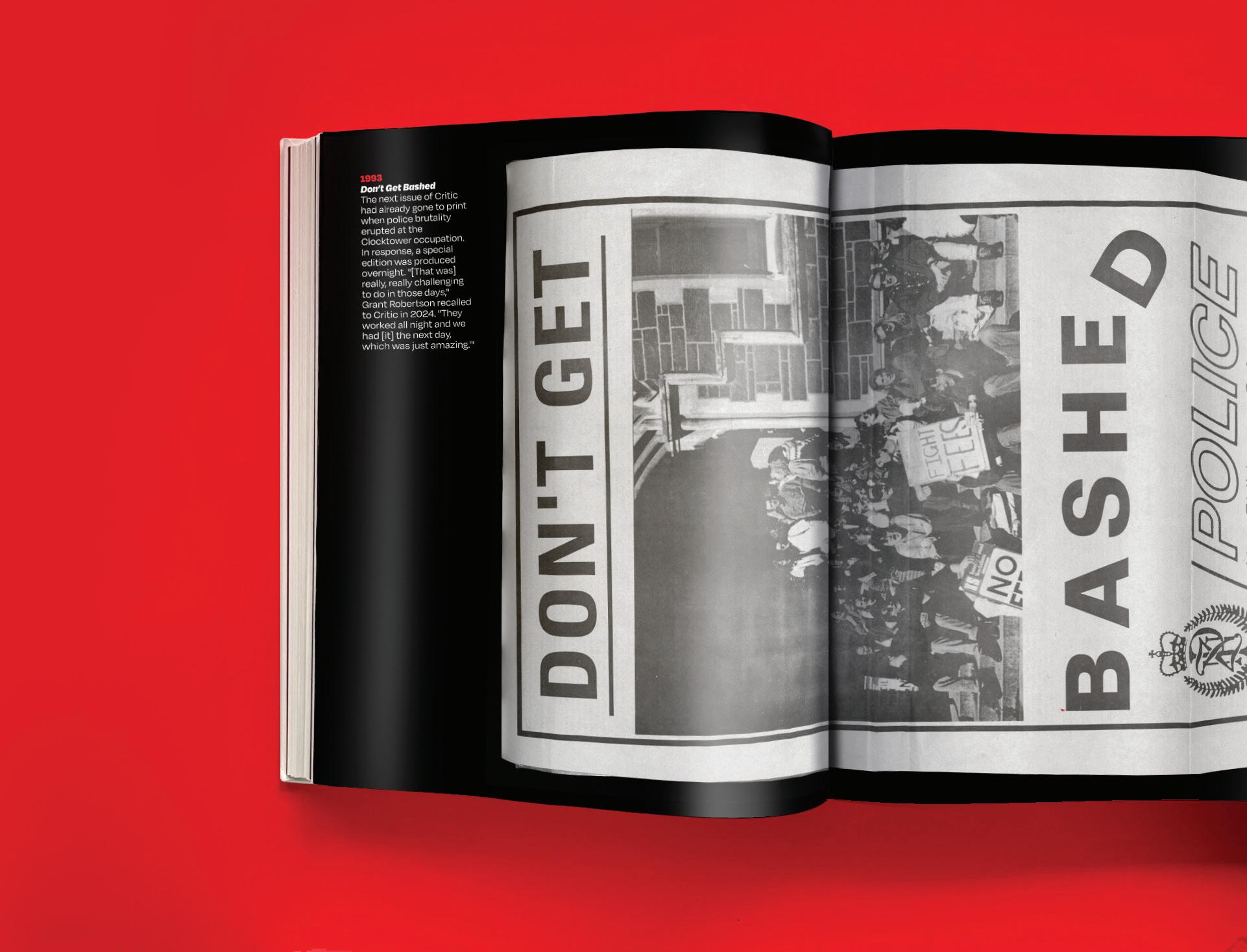
Occasionally accurate since 1925, hardbound
Disclaimer: Critic’s reporting on themselves again.
Critic Te Ārohi’s very own Iris Hehir hung up her Features Editor and Law student boots last week, signing a contract to commit to a full-time position as the Editor-in-Chief of Critic’s centenary book. The elevator pitch: “A century of the Otago student experience through the eyes of Critic Te Ārohi.”
The contract was birthed out of a tense period of uncertainty over the project’s viability, dependent on raising enough donations to fund a salary, before pulling out of her papers on March 16th. With Otago University Press as the publisher and Critic’s current designer Evie Noad as the planned designer (pending contractual agreements down the line) it seems this is one pipe dream that’s set to become a reality.
Iris explained that the book’s origin story began at her flat’s kitchen island mid last year. A casual conversation between her and flatmate Evie (Critic insularity alert) about the centenary spiralled into a book proposal brainstormed on their whiteboard, one typically reserved for monthly updates of everyone’s ins and outs: beverages, trends, health phases, and political takes included. “I feel like no-one was really thinking about [the centenary] at that stage and I thought it would be cool if we all put together a book,” said Iris.
As Critic’s Features Editor for the second year in a row, Iris said she’s always felt that there should be a TV show about Dunedin students. “There’s just such a wealth of stories and stuff that’s happened that just feels so unreal. To be able to pull all that together in one place is just going to be amazing.” Paddy Gower echoed this sentiment to Critic Te Ārohi during writer’s training earlier this year, describing Dunedin as a “hot bed of stories” –although he could have been referring to the booming drug scene he’s become known for reporting on.
With the whirlwind of Critic’s weekly print deadlines and an intense Law exam season after the initial book brainstorm session, the idea was only revisited in November – by which point Iris had pitched the idea of working on the book full-time. In-between packing up her flat, road tripping to Nelson, and working double shifts at a hotel (morning housekeeping and evening waitressing), a “very ambitious” book proposal was fleshed out. The 18-page proposal went into as much detail as describing the evolution of the “fuck Arana” chant’s popularity and letters to the editor from the ‘40s that angrily complained about women wearing pants on campus.
February was spent working on a month-long contract to “get the proposal up and running,” explained Iris. She and Evie put together
By Nina Brown Editor // critic@critic.co.nz
the refined proposal, fine-tuning the vision of the end-product and finding a way to make it a reality. “It’s really important to note that OUSA doesn’t have the capacity to put in anything,” Iris said. “I feel like maybe when you hear about a project like this you assume it's with the backing of an institution. We do have the backing in terms of support, but we don’t have the financial backing.”
Launching the proposal on February 24th with a Critic Instagram post, it only took three weeks of fundraising through private donations and pledges to raise $35k. This included a generous $1000 from OUSA’s own Mr President Liam White, $10k from former Critic Editor Zane Pocock, and a further $10k from a mysterious anonymous donor. It was half the goal amount of $70k for a salary, but enough for OUSA to hit the green light on the project – contingent on further donations. “So if those donations were to stop coming in, the project would get pulled. And that’s a constant risk unless we can continue the financial support,” Iris stressed.
A high point for Iris and the rest of the team was to see the reaction to the proposal as the support rolled in – both through messages of enthusiasm for the book and in the form of pledges. “Just to see everyone come together, it makes my salary way more meaningful because every dollar is someone’s love for the mag and what it means to them, and that makes it even more special,” said Iris. “It’s a testament to Critic’s cult-following. It’s really amazing to see the legacy [and collective identity] that we still have.”
The next 11 months will be spent digging through the archives at the Hocken Library, which houses every issue of Critic extending back to the very first. Outside of paging through newspaper copies of Critic, a huge chunk of the workload will involve networking with former alumni to contextualise stories and get a “long view” of Critic beyond what Iris has known in the three years she’s worked here. “It really hits home that this is bigger than myself, or bigger than us in the office today.” She plans on weaving behind-the-scenes anecdotes with reprinted articles and design to create an “immersive experience”. “There are a lot of very fun antics and stuff that never makes it to print in the story. There’s a story about making the story.”
The freshly-minted book editor at 21 wrapped up by expressing her enthusiasm to get stuck in. “Honestly I’m just looking forward to holding it,” she said. If you want to make Iris’ dreams (and the dreams of all of us here at Critic – past and present) come true, consider pledging – every cent really does count.
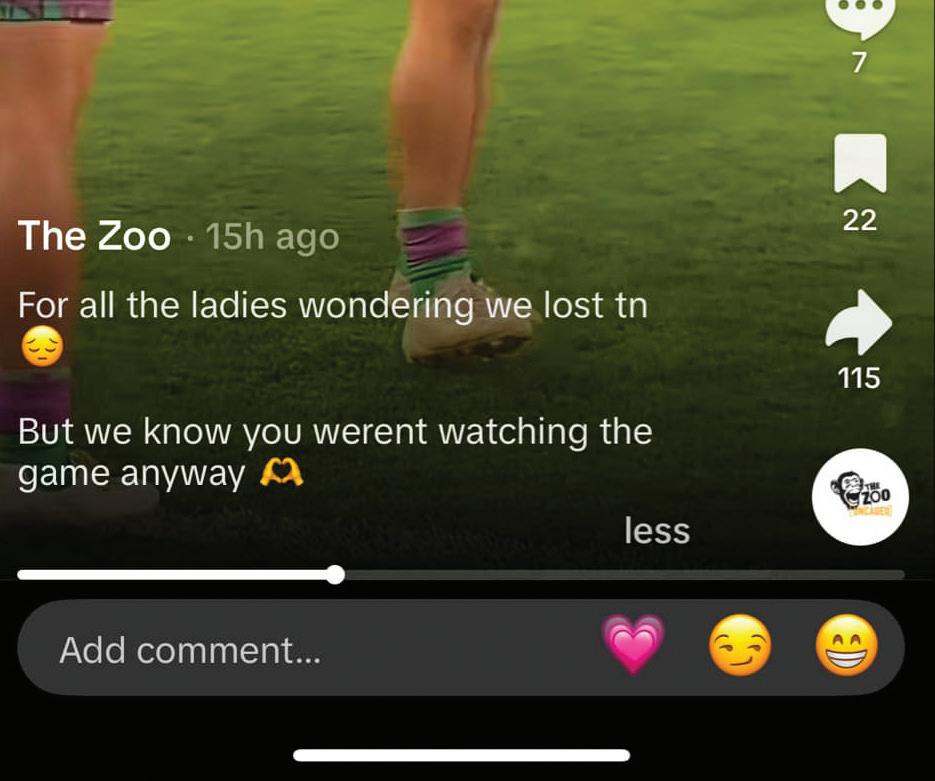
The Highlanders’ second home game of the season on March 14th against the Hurricanes was soured by reports of anti-social behaviour from the Zoo and a distastefully misogynistic ‘Zoo Uncaged’ social media post. A Highlanders’ spokesperson said it’s not on, boys.
Critic Te Ārohi was alerted to the social media post shortly after its upload. The post in question was a video of various Highlanders players on the field. The post's caption read: “For all the ladies wondering, we lost [tonight]. But we know you weren’t watching the game anyway.” A similar post was also uploaded on the associated Instagram, but both have since been removed. Critic columnist and avid rugby watcher Molly sent screenshots of the offending post to the news team, commenting that the caption was an “insinuation and building up the stereotype that [watching] rugby is purely for straight men.”
Critic Te Ārohi approached the Highlanders for comment on the post and its subsequent criticism. A spokesperson told Critic that the post didn’t reflect their views and “shouldn’t have been put up.” It was taken down when the Highlanders saw it. “We use the Zoo Uncaged channel as a ‘students for students’ type of platform but our guidelines and approval process will be bolstered, as this one shouldn’t have made it through.”
Students Katie and Georgie, who were familiar both with the TikTok trend of posting attractive players on the field and the Zoo TikTok, still reckoned the caption and video were pretty “ew”. “It’s reproducing gender stereotypes,” they said. “Why is it targeted to only women? It’s part of that idea that women don’t care about rugby in general, or don’t understand the rules – like it’s a masculine sport.” They argued for the duality of appreciating the Highlanders’ form in both senses of the word: aesthetic (“they look good”) and athletic (“that was a really shitty kick”). “You can enjoy both [the players and the game],” they agreed.
By Hanna Varrs & Cailin Williams News Editor & Contributor // news@critic.co.nz
Unfortunately, the Zoo’s online presence hasn’t been the only thing that’s garnered negative feedback. When attending the game as media, Critic staff member Jordan was verbally harassed by another Zoo-goer. Not only were their Doc Martens insulted, they were called homophobic slurs and encouraged to “meet me outside” – presumably for a fight. Jordan commented, “It felt like being in high school again honestly. It’s kinda like, I thought we were done with this shit, you know?”
It’s true that the Zoo can have an “American pep rally vibe”, as commented on by fifth-year students Abby and Georgia. While they both said they had fond memories from the stands, they added, “Rugby gives off the energy of a boy’s club, [and along with that] comes the attitude of stereotypical masculine behaviour. [Men] are there in mass groups, so feel immunity in numbers.” Both reckoned that people felt they couldn’t call out bad Zoo etiquette because of intimidation emanating from these larger groups and knowing no one else would stand up to them. “No one is going to go up to a mass group of boys and tell them that what they are doing is wrong.”
In response to Critic’s report about how Jordan was treated, the Highlanders told Critic Te Ārohi, “Everyone has the right to come to the rugby and have a safe and enjoyable time and anyone who is verbally abusive can be asked to leave [...] We would advise anyone who experiences negative or anti-social behaviour to please report it to either Security, Red Frogs or a Highlanders event staffer so that it can be dealt with at the time. We also have a number you can text to report anti-social behaviour at the game (text ASSIST to 5256 and include your location in the stadium), this number can also be found on signs on the concourse.”
“I was the first ranga Prime Minister of New Zealand” - Chris Hipkins
By Ella Grayson & Jonathan McCabe Contributor & Staff Writer // news@critic.co.nz

Teasing the chance to have a yarn with big ticket item Chris Hipkins last Wednesday, the Labour Party and Young Labour Party hosted an open to all, town-hall-esque kōrero at The Bog, “Ngā Reo Rangatahi, The Voice of the Young People”. The purpose of the event was to give youth in Dunedin the chance to raise concerns to Chippy and members of the Labour party, following their loss in the 2023 election.
Despite the reputation students have earned of political apathy, a punctual crowd of mainly students packed out the function room of The Bog – eager for an event of comic contrast to the St Paddy’s celebrations there earlier in the week. Club representation was strong, spanning all flavours of political portfolios: POLSA, Amnesty Youth, Thursdays in Black, Otago Campus Greens, OUSA Exec, Free Fares, Pride In Law Otago, the Local Electorate Committee, environmental groups, and more. Each group came with a list of questions, seeking to push their agenda into policy (points for guessing what Free Fares wanted to ask).
King of the Gingers and Leader of the Opposition Chris “Chippy” Hipkins made an entrance befitting any good opposition entering the boxing ring of politics: to Madonna’s ‘Material Girl’ (no, really). Cue clapping and camera flashes for the former Prime Minister. Chippy was led in by coach Jill Day, President of the New Zealand Labour Party and former deputy mayor of Wellington; and joined by rising star Ethan Reille, the Young Labour President standing as the youngest candidate in the 2023 General Election.
Chippy strode past the star-struck young politicians to wait in the wings while Southern Young Labour warmed up the crowd: the comedian to Chippy’s main act. The King appeared humble, calm, sincere, and slightly tired as he took his place. He pulled off his red tie and popped his first button with one hand, Coke in the other (the drink). The jury’s out on whether this was a display of immense “chill” or rising heat from anticipation.
Jill Day was next to take on the crowd. She explained her role in facilitating the party’s campaign and building the manifesto. Looking at those gathered, she stated with sadness but also an air of hope that, “A huge number of people are disengaging from the political process, claiming democracy no longer is working for them. This is sadly disincentivising young people in particular to vote.” Her goal in this campaign is to increase engagement across the whole population. To maintain a thriving democracy, “we need all hands on the deck.” A bold thing to say in a Kiwi accent, but she executed it perfectly.
It was then Chippy’s time to shine – and the people were excited. He first addressed key issues facing the next generation: the unbuilt hospital gathering cobwebs under this coalition; the
long-term fears of climate change for the world that students will inherit; and the Treaty Principles Bill which is an “attack on our national identity and constitution”.
Mr Chip then became nostalgic. He shared his “why” for entering politics in the first place: to make a difference and create an Aotearoa New Zealand which he and the people believed in. This narrative began at a young age, blossoming within his university career as the Victoria University Student President between 2000 and 2001. He spoke with passion about his “central focus” of the unity of the people and having individual rights. We’re talking access to appropriate healthcare, healthy homes (maybe even owning one), and NZ-based jobs (no more jumping across the ditch).
To segue from this speech, Chippy announced: “I want to hear from you, not monologue at you.” So into question time we went – an experience of student political engagement at its finest. The respectably prepared cohort of clubs were equipped with more questions than Critic Te Ārohi has the space to report on in detail (you had to be there). Two salient moments included Thursdays in Black’s question about the recent repeal of the Sexual Health Programmes within the school system (Chippy wasn’t in favour); and Amnesty Youth’s about the current government’s handling of youth crime (also not a fan).
Critic Te Ārohi used their chance in the bullpen to ask why students aren’t receiving the benefits of the coalition's 2.9 billion dollar tax cuts on landlords. Chippy asked the room, "Has anyone had their rent go down?” Crickets. Point made, he proceeded to critique the government’s decision to reinstate full interest deductions for residential property. National’s argument that tax breaks would decrease rent “does not hold up,” he argued. Without disclosing any future plans for tax policy, he suggests that “if we're going to have tax incentives for property, it should be for the people who are building more rather than the people who are buying existing houses.” All with the intent to set a more even playing field for first-home buyers.
Following question time, Critic Te Ārohi took the opportunity to approach Chippy as he was paying for his niece's bar tab. The most pressing question on our mind was why Hipkins thought he had the right to call himself the “King of the Gingers” on national television. To that, he proudly gloated that he was the “first ranga Prime Minister of New Zealand.” Between that and Residential Rep Callum telling Critic that his biggest takeaway from his own interaction was Hipkin’s weirdly “soft hands”, it was an evening of hard-hitting politics and pints.
“If it’s not broke, don’t fix it.”
A working group is set to discuss the possibility of changing undergraduate papers from 18 to 15 points (as well as semester weeks). The group includes senior University staff, several academics from different divisions, and Academic Rep Stella Lynch. They’re set to meet on March 31st and report their findings back to Senate (Uni's academic big wigs) at either the April or May meeting.
The paper explaining the possibility of change went to Senate last year. Stella explained to Critic Te Ārohi that there seem to be three main points ‘for’ the change. The first is attempting to even out student workload across the semesters – students would take 4 papers per semester to make up the points they need for the year. The second is allowing students to choose a broader selection of papers to contribute toward their degree (students would take 24 papers instead of 20), and the final point suggests easing the process for students who wish to change between Otago and other universities in New Zealand.
Speaking to the first point about evening out workload, Stella explained she didn’t feel this would actually be all that beneficial for students. The 18-point paper model allows students to take seven papers every year and still get a degree out of it. “This is a good thing for student-athletes and students who may fail a paper,” she told Critic.
A 15-point system would require students to take eight per year – an extra four papers to complete their degree. Stella used the example of her own Ecology degree to illustrate the importance of this. “I failed STAT210 in my second year, which is a major requirement paper for ecology. Because of the uneven workload, the 18-point system, and only taking three papers in one semester, I could retake that paper in my third year.” Stella wants to make it clear that taking seven papers gives students leeway if they fail a paper. You can retake things and not add time to your study in most instances. “I wasn’t gonna be pushed a semester behind. I could graduate with my cohort.”
On the second point about a broader selection of papers for students to complete during their study, Stella also had her concerns. Firstly, she wondered about how departments would go about reducing their papers down three points. “It’s a huge piece of work. To do it right, each department has to go through and stocktake the content in each paper and then figure out what is worth keeping [to reduce the three points].”
Furthermore, she explained that “it’s been signalled by the University several times now that our paper offerings are not going to increase [...] At the moment, it’s generally a one-in-oneout rule.” The University was trying to streamline their paper
By Hanna Varrs News Editor // critic@critic.co.nz
selection through this. “If you’re asking students to take four more papers to finish their degree, they’re not actually going to be able to take them from their programme of study.” She provided the example of how senior History students struggle to fill their degree with 300-level History papers. “You’re asking students to take more papers from a shrinking pool of papers.” The ramifications of this may be more timetable clashes and more admin for the Uni to handle. “I don’t think we’ve thought about the consequences of this – at all.”
On the point that transfer of credit may be made easier, Stella expressed that she had not heard of students complaining that the process was too difficult as it was already. “It’s not impossible,” she affirmed, expressing a general sentiment that “if it’s not broken, don’t fix it.”
There is also an outlying issue about paper costs. In theory, she explained you’d be paying for 360 points’ worth of content for completion of your degree under the 15-point model. “But you’d be doing twenty-four papers instead of twenty, so there’s more administrative costs to front up. I don’t understand how we’re going to be paying the same amount – or at least, I’ve got no confidence that if costs go up, it’s not a direct result of moving to a 15-point paper model.”
“I don’t think we’ll be moving to a 15-point paper model,” Stella said. “Pigs might fly before we do that.” She explained that while this is a conversation that may be had again in ten years, she felt there was little academic or student appetite for the potential shift. “I intend to go [into the working group] and just nip it in the bud.”
Stella doesn’t seem to be alone in her thoughts. This was the first time that four out of five student representatives in Senate had spoken up about a particular issue, and reportedly the first time the UOPISA President had spoken on an issue in Senate. “It’s quite big, [because Senate] is a really scary room to be in. It’s in the Clocktower Council Chambers – a massive meeting. People who are head of department, heads of division. And you’ve got to go in there and represent students.”
When Critic Te Ārohi approached the University with a long and detailed email with Stella’s comments and concerns (emphasis on the latter), the response was a short and to-the-point answer: “It was agreed at that meeting that a review be undertaken to consider different alternative point values for undergraduate papers. A working group has since been established to undertake the review and has been consulting with students and staff [...] No decisions have yet been made.” Sit tight, ig.


ur ‘thank-you’ card for the free advertising is in the post xx
A former Frederick Street flattie has let Critic Te Ārohi in on an inside secret. The scoop? LJ Hooker’s ad for their former flat is giving Critic free advertising.
It began as the historic student tradition of plastering Critic covers on their flat wall. Former flattie Jessie described the collaging experience as the “highlight” of the flat’s week. In 2020, one of the covers that made the cut was the iconic ‘cigarette butt’ – a photographic masterpiece featuring fifteen durries sticking out of somebody’s ass.
Seemingly unaware of her own pun, Jessie said, “It was crack-up as, so of course we had to put it on the fridge like a proud mum of their child's artwork.” And there it stayed, it seems, when the LJ Hooker photographer took pics for the flat’s online ad.
Needless to say, it’s become a flat tradition for the group to stalk the LJ Hooker website and see the increasing rent (the real inflation measure) and pictures of their old flat from 2020. And without fail every year, Critic’s (arguably iconic) bum cover from 2020 features front and centre of the picture of the lounge.
“Every single year they use the same pictures! It is 2025 – five years since living there and they are still using the same pictures. LJ Hooker really be giving [Critic] free advertising without fail each year, and it’s the best cover.” We are so blushing. Jessie tells us it’s what she’s looking forward to for 2026.
The unusual tradition and associated running joke is now a fond memory of Jessie’s Polytech days. “I want that [picture] to stay
By Gryffin Blockley Staff Writer // news@critic.co.nz
there forever,” she said. With the topic of the bum cover within her old flat resurfacing each year, she hit up Critic to get us in on the joke.
Jessie said she couldn’t help but(t) wonder why the cover had remained up throughout the years and several changes in tenancy, one would assume. “I mean, come on. Have you not noticed that picture? That's hilarious,” Jessie said. Maybe the photographer and LJ Hooker found it funny, or simply haven’t noticed? We’ll never know – LJ Hooker did not respond for comment in time for print when Critic tried to follow their line of reasoning.
Jessie did say that it was “probably not” a testament to the laziness of property managers in North D, not being able to recall any beef from their days of tenancy. The most likely answer, she pondered, was that the flat hasn’t been done up – hey, if it ain’t broke. “Obviously if they did up the flat, then it's not gonna make sense to keep the same pictures. But man, if it looks the same from five years ago, I reckon that's pretty good advertising,” said Jessie.
At least for now, Critic and Jessie will be twiddling their thumbs for the 2025 flat drop, to see whether the durry-bum will make its sixth annual return. Whoever takes over this Frederick Street flat should consider themselves lucky, and explore the possibility of reviving a super cool tradition *wink*.

Students report feeling broke and stressed due to StudyLink delays – what’s new?
Students all around Aotearoa have been facing some extra financial hardship over the last few weeks, with many failing to receive their expected StudyLink payments or living costs payments. With day-to-day costs already a pressing concern for students, delays in financial assistance have left many scrambling to cover their rent, bills, and other basic expenses.
The start of the year saw huge lines at AskOtago, as students tried to rush the ‘education provider confirmation’ step in their enrolment process. But it seems like backed-up lines of frustrated students weren’t just limited to AskOtago. Critic Te Ārohi has been approached by several students who, four weeks into the semester, have still not been accepted for a living costs payment – despite having received it in previous years. Others report delays in their payments and are struggling to make ends meet in the interim.
When contacted, StudyLink told Critic: “We are experiencing a higher number of applications this year. We are ahead of last year in terms of the numbers of applications we have processed, and we have reallocated staff to respond to the high demand.” Long story short: StudyLink are busy as fuck. “We have processed 5,742 more student allowance applications and 16,273 more Student Loan applications compared to the same time last year,” they told Critic.
Rene, a second-year teaching student, is among those waiting for StudyLink confirmation. She told Critic Te Ārohi that she’d sent a document two weeks prior that they still hadn’t processed at the time of writing. She didn’t mince her words: “It’s a fucking fuck around.” Jono, another student Critic spoke to, noted that, despite not personally having issues with his StudyLink, he empathises with those who are: “You have to wait like two hours on the phone to get it sorted.” Brooke Fraser’s ‘Arithmetic’ gets old after the tenth repeat.
For students navigating StudyLink for the first time, the process has been equally – if not more – challenging. Tevya, a Masters student in Business and Marketing, explained to Critic that the
By Molly Smith-Soppet Staff Writer // critic@critic.co.nz
process has been especially painful for her. She’s been trying to call StudyLink twice a week for the past month to sort out a mishandling of her application that would mean having to repay $1200 for Jobseeker payments while her loan application has been in the lurch. She’s been met with 90-minute wait times or being told that they were too busy to take her call. While StudyLink has advised she’ll be back-paid, the experience has been frustrating and stressful while easing into her Masters.
StudyLink is a service of the Ministry of Social Development (MSD), which also oversees Work and Income. With job cuts last year within MSD, some students are left wondering if there might not be enough people to do the job. “It just seems ridiculous that you can jump the queue just by calling up – it's their job to process our applications. Why are we four weeks in and this is still happening?” one student wondered to Critic. Izzie, a fourthyear Geology student, has received the living costs payment throughout her degree so far but has yet to receive confirmation for this year. “I don't have a job, so I'm currently using my 21st gift money to pay for my expenses. I'll have to ask Mum for rent money next week.”
OUSA President Liam White acknowledged the widespread frustration among students – not just at Otago, but nationwide. With Otago experiencing an increase in enrolment (2.7% since last year) it comes as no surprise that many other universities are in the same boat. “[It’s] pretty scary to be honest,” Liam empathised. “On the StudyLink side it's full-on, not good enough.”
StudyLink has reassured students that those whose payments have been delayed will be eligible for back-payment once approved – but only if they applied prior to their study start date. The University urges students experiencing delays in processing, or experiencing financial hardship as a result of this situation, to contact StudyLink to find out where their application currently sits and explain their financial situation. Students can also reach out to OUSA or the University’s Pūtea Tautoko Student Relief Fund for support.

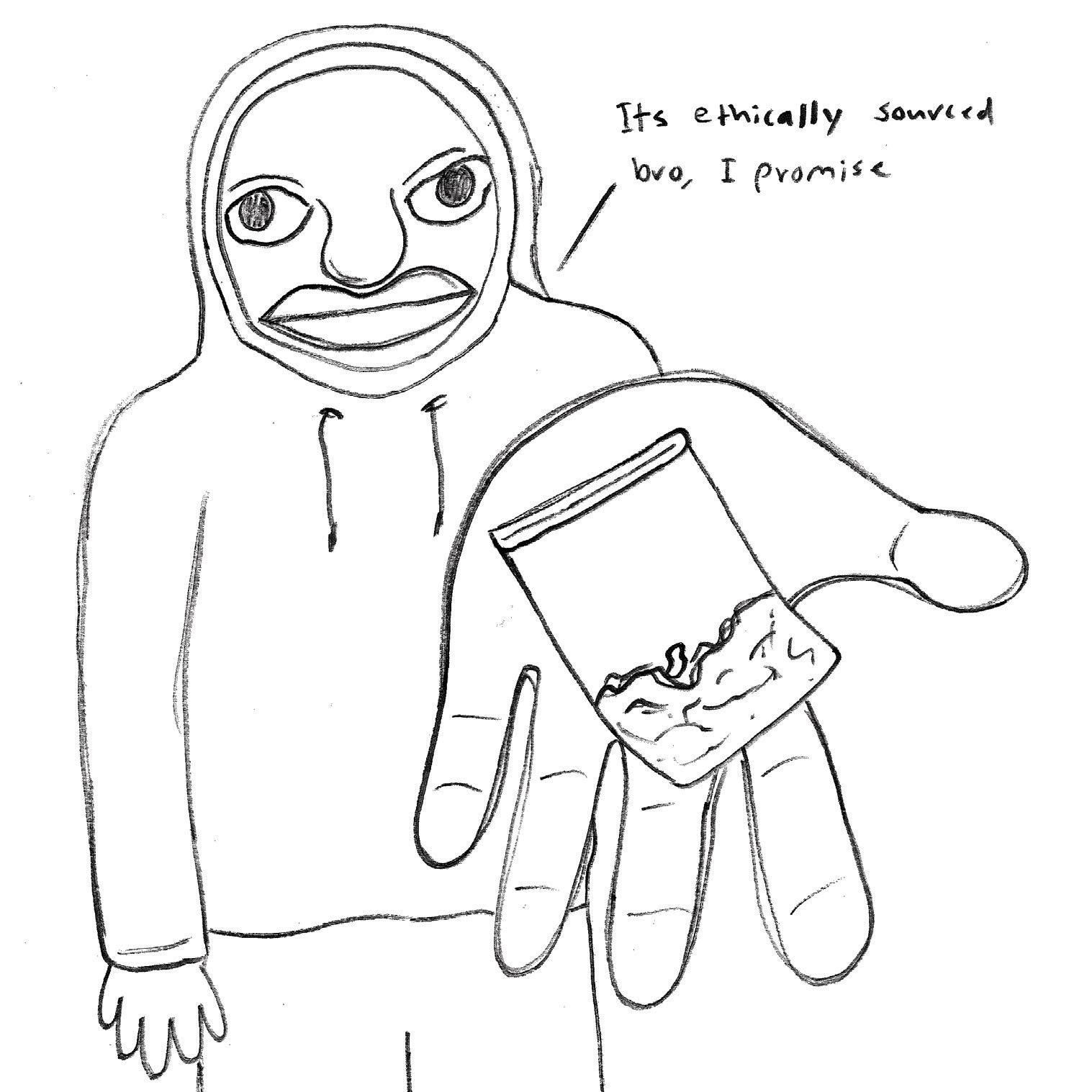
“I’ve done research, I follow Shit You Should Care About”
Local third-year Food Science and Nutrition Student student Molly Edwards, a self-proclaimed fitness and wellness influencer, who preaches the benefits of clean-eating, early morning runs and therapeutic properties of Saunas on her Instagram account (@MolsHolistic) put a pause on her ‘daily diaries’ in order to get “completely fuck-eyed” on St Paddy’s Day.
Despite spending the last three months boycotting palm oil and other processed foods due to their unethical business practices, Molly remained adamant that the half-gram she purchased with the ‘girls’ was “ethically sourced because it

By Anderson Coomer Shitposter // criticaltribune@critic.co.nz
came from a family business in Colombia or something like that.”
Speaking to Critical Tribune, Molly maintained that her bag of meth was, “100% MDMA, I don’t even need to test it! The guy I bought it from was really nice; he even gave us a discount!”
As of print, Molly was last seen ranting to her Instagram followers about lifestyle choices, “At the end of the day wellness is all about balance, and I haven’t done a Shein order in over six weeks.”





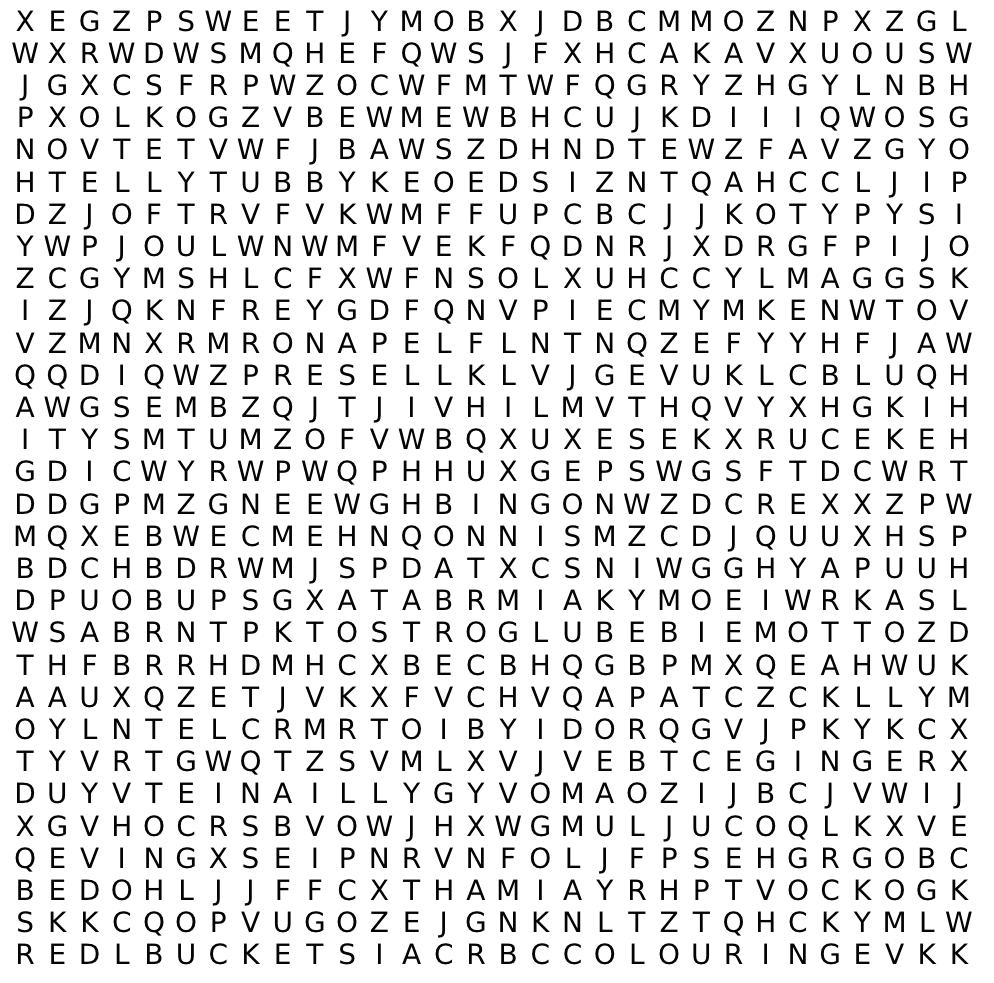
UKULELE CONTRACT
STUDYLINK
HURRICANES
PEP RALLY
CIGARETTE
ETHICAL
LAB RAT
CONSENT
ETIQUETTE
POLITICIAN
BUTTER
DOODLE
PORNHUB
POTENT COUGH
JAZZ GONSTER
BAKE
PISCES CORRECTION
ARTICHOKE
COLOURING
ARCHIVAL
TELLY TUBBY
CABBAGE
HUNTER
MARKET
RESELL
BINGO
SWEET
BURGER
GINGER
BUCKET
OFFLINE
There are 10 differences between the two images


There are 10 differences between the two images


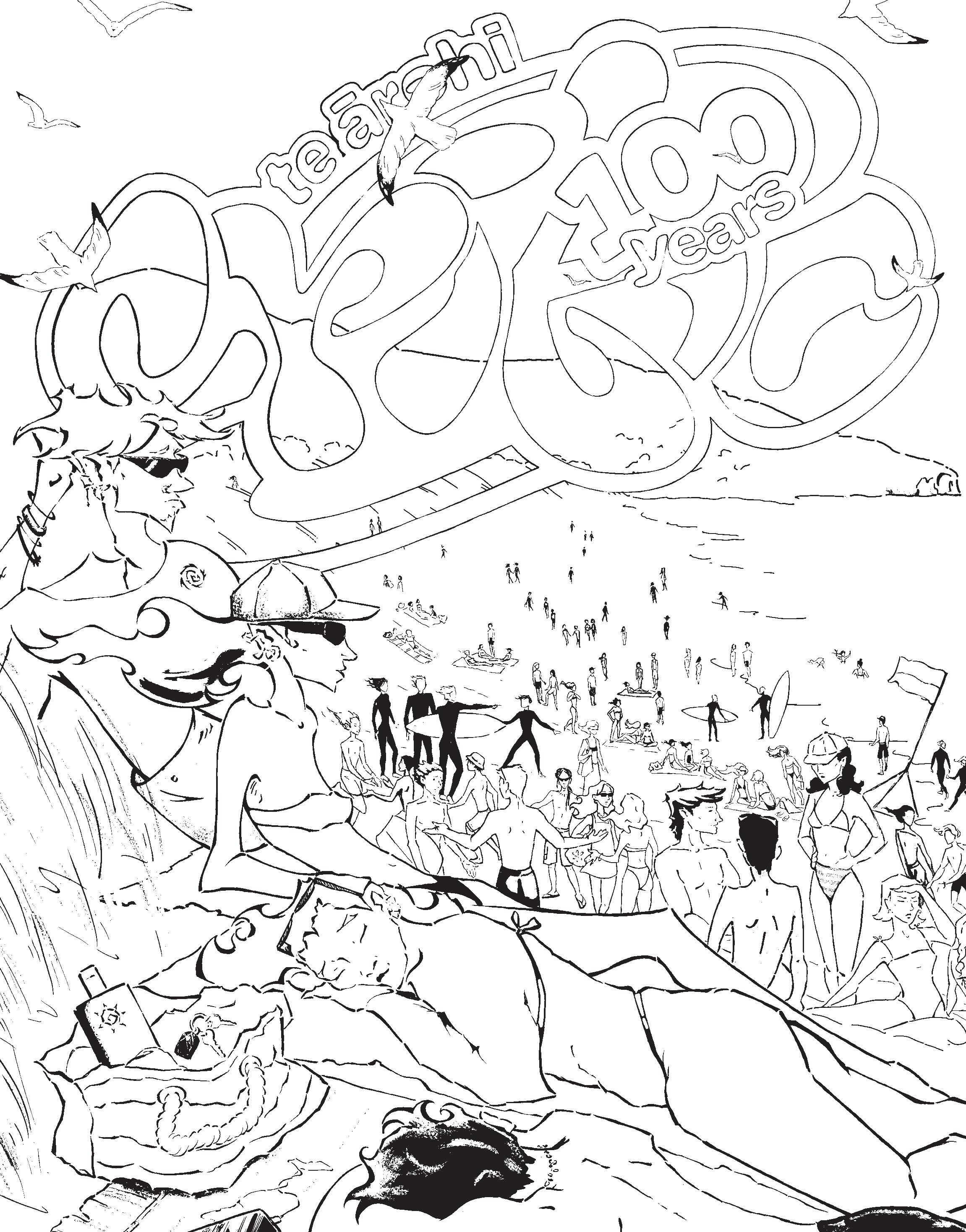

POV: You just spent the last of your allowance on gig tickets, your fridge is a wasteland, and you’re dangerously close to monetising your toes. But there, casting sultry, cash-flashing bedroom eyes at you from the back of a discarded Critic on your coffee table, is a Zentech ad. A clinical trial or two might be your ticket to a life beyond toast and despair. Rest easy, Big Pharma is here to lull you to sleep.
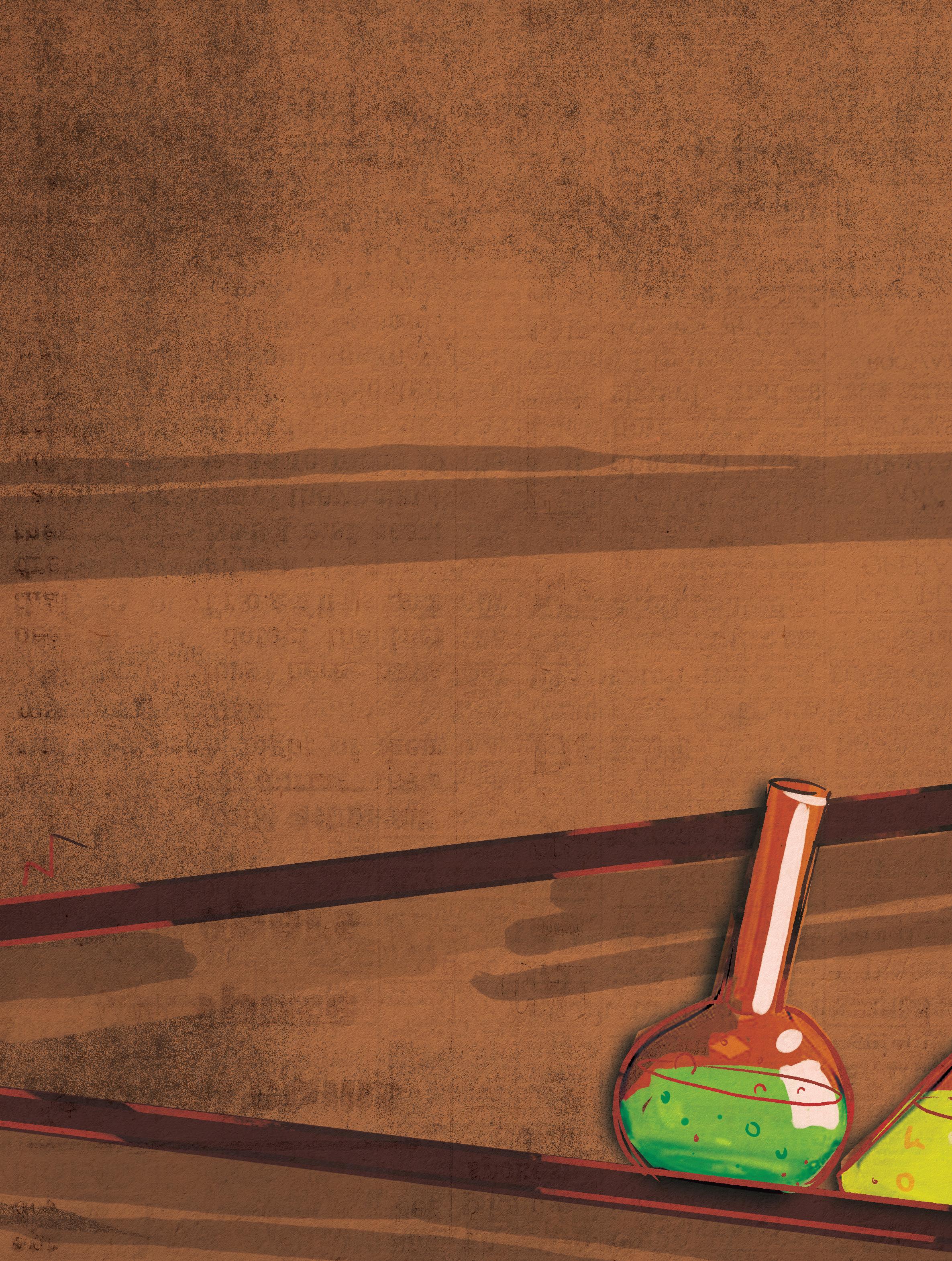
We’ve all seen the Student Job Search listings, the stalls at Tent City, and the posters in the Link. Calls for participants for human research trials are about as common as all-season jorts in north Ōtepoti. But is recruiting the desperate dodgy, or simply a win-win for medical advancement and struggling students? To find out, Critic Te Ārohi delves into the perils (like giving yourself a lifethreatening sodium deficiency, as it turns out) and possibilities of becoming a lab rat with a loan. Spoiler alert: This author is now booked for one next week.
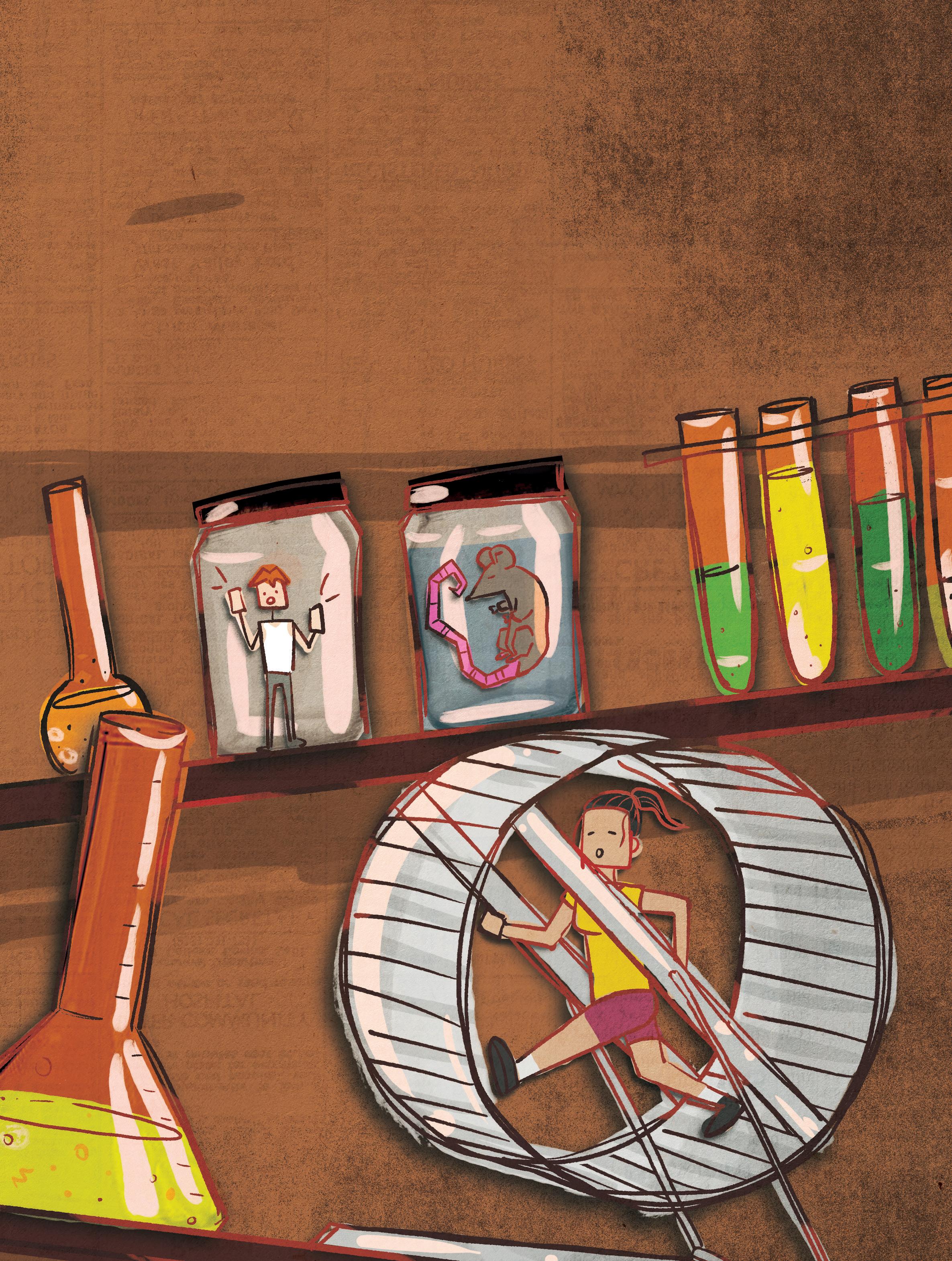
By Jodie Evans
In simple terms, clinical trials are test runs to check the safety and effectiveness of new medical treatments. This might look like slathering on a mystery cream or popping a few pills while your lab-coated sugar daddy keeps a close eye on you. In exchange for a paycheck, you do your best to ignore the possible threat of ‘mild to severe’ swelling, nausea, diarrhoea, abdominal pain, indigestion, and muscle pain.
These human research trials are crucial to improving health outcomes and quality of life for future patients. Every drug or medical intervention available to the public, whether it's your antidepressants or birth control, is owed in part to some human guinea pigs. Willing participants are compensated for their time and any risks involved; the bigger the risk, the bigger the paycheck. A quick Google search reveals several studies recruiting participants in Dunedin. These range from neuroimaging trials paying $100 for MRIs, to a trial offering $2,500 for participants to spend 18 days testing iron supplements.
And that’s where the appeal seems to lie for students. Earlier this year, an informal poll by the OUSA Exec found that the cost of living crisis was overwhelmingly one of the biggest concerns for Otago students. With Studylink’s maximum living cost loan at $316.39 per week and Ōtepoti rent prices climbing over $200 (if you want somewhere that doesn’t have rats in the walls), students are left with shit-all for remaining expenses. According to a 2022 survey by the Green party, two-thirds of students in Aotearoa admitted to regularly struggling to afford living basics, like groceries.
Ordinarily, low-income communities face significant barriers to entering clinical trials. Lack of education, distrust in healthcare, and difficulty accessing transportation are all contributing factors. Our North D community, however, is unique. Back in

2022, the University of Otago’s Strategy and Analytics Office reported that 60% of its first-year students came from decile 8-10 secondary schools. Often hailing from affluent, welleducated backgrounds, Otago students are nonetheless thrust into temporary food and housing insecurity by circumstance. Students, simply by nature of attending a research-driven institution like the University of Otago, have a strong familiarity with science and academic research. This trust in science and healthcare, paired with a hunger for a livable income, makes us the ideal concoction for that all-expenses-paid lab life. This makes clinical trials a shitload more accessible for students (quite literally – recruitment flyers can be found inside the library toilet cubicles).
On campus, clinical trials become a convenient opportunity to stay financially afloat. It would be cool to imagine students as entirely altruistic here, pledging their healthy (if you consider five hours of sleep and inhaling fungal spores from our landlord’s musty curtains on the reg “healthy”) young bodies to medical research. But with pint-flation seeing campus’ midweek Summit Ultras hitting $7, that’s unlikely to be the reality.
This leaves the lab rats of North-D in a potentially vulnerable position. Informed consent is to research ethics what a privacy setting is to social media: an essential part of protecting your wellbeing. Before joining a study, you should understand its purpose, procedures, potential risks and benefits, and your right to withdraw at any time. If the only side effect students are really weighing up is rent money, is that still informed consent? Perhaps the pressures of student poverty make trial compensation seem overly attractive, pushing student involvement into the territory of what’s called 'undue inducement’. This is when payment heavily sways someone into participating in a trial, overriding their ability to make a free, informed choice. Critic Te Ārohi consulted clinical trial participants, Cassie, Molly and Ava*, and bioethics professor Angela Ballantyne, to find out.
After losing hundreds on a cancelled concert (look at what you made her do, Lewis Capaldi), Master of Applied Science student Cassie found herself offering up her body to Zentech for $650. Zentech is an Ōtepoti-based independent contractor that conducts human research studies for pharmaceutical companies. They’re also located in that off-white mirrored windowed meth-lab chic building on Frederick Street (slaying the indie sleaze trend). Cassie responded to one of their adverts for an eczema treatment trial. For two days, Cassie sat in a hospital bed with ointment on her arm, caught up on missed lectures and ate Domino's pizza. While eczema cream isn’t death-defying, Cassie admitted she might be tempted to pay less attention to the fine print when the compensation was high enough. "There's a lot I'd do for money," she confessed with a shrug. "Have you ever read the side effects of birth control? It's insane, and we all take that.”
Fourth-year Politics and Communications student Molly entered a COVID-19 needle-length study through Pharmacy Research Network. She also admitted to being unfazed by potential risks, equating them to those she takes daily: “As a student with an active social life I already damage my body [with alcohol] so why not do it for a bit of coin?” For trialling a COVID-19 booster, either injected into the muscle (intramuscular) or into the layer of fat just below the skin (subcutaneous), Molly will be compensated $235. Most of which will go towards groceries, rent, and recreational habits that damage her body.
Professor Angela Ballantyne, an expert in human research ethics, explained to Critic that the majority of these trials are well-tested before they even hit campus, and are, for the most part, low-risk. Clinical trials are divided into phases, with phase one being the earliest and riskiest test. Just like a relationship moving beyond the first date, medical treatments become safer and more reliable as they progress through the phases. Phase three is the equivalent of farting in front of your partner (and they don’t get the ick).
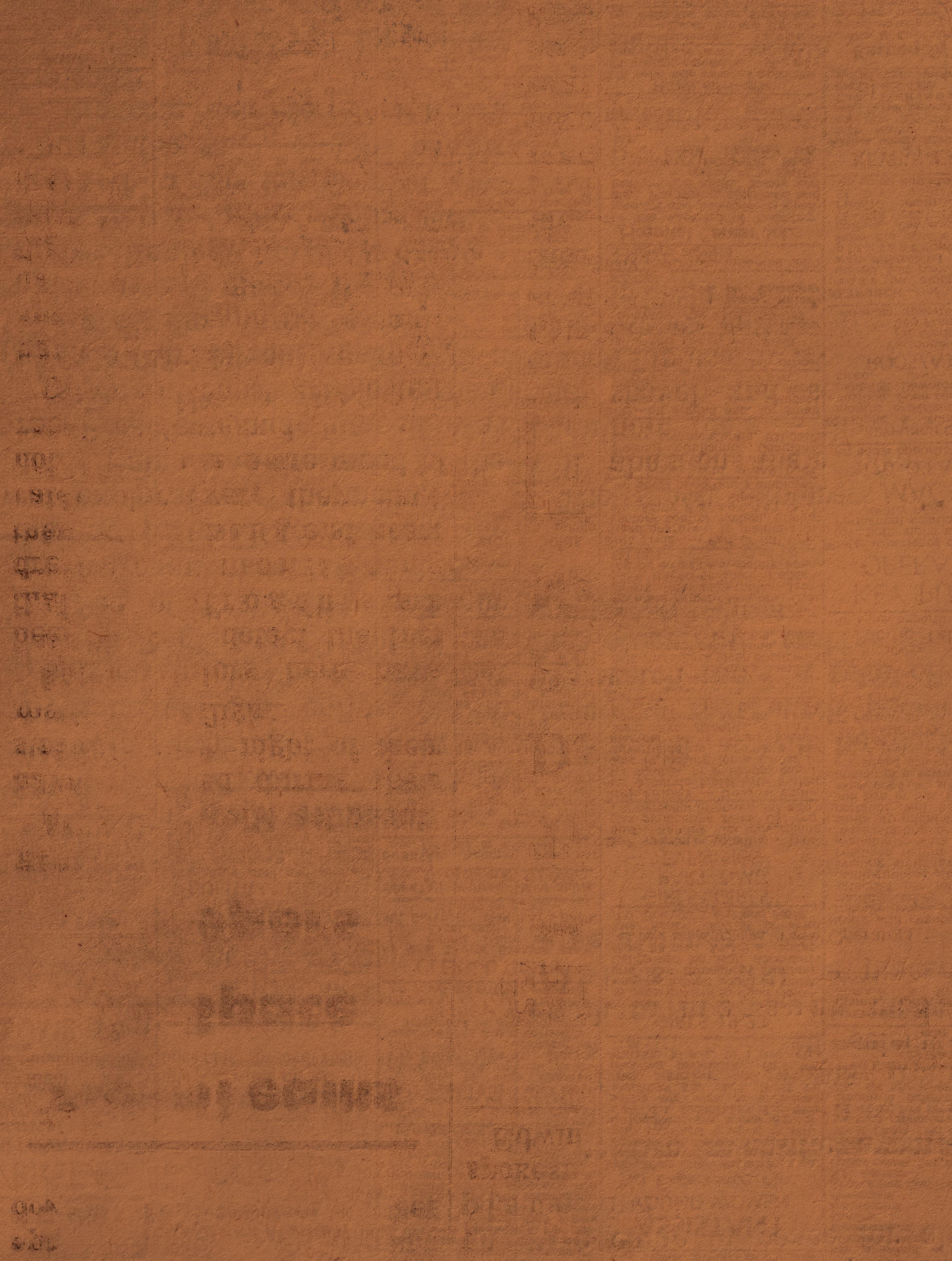
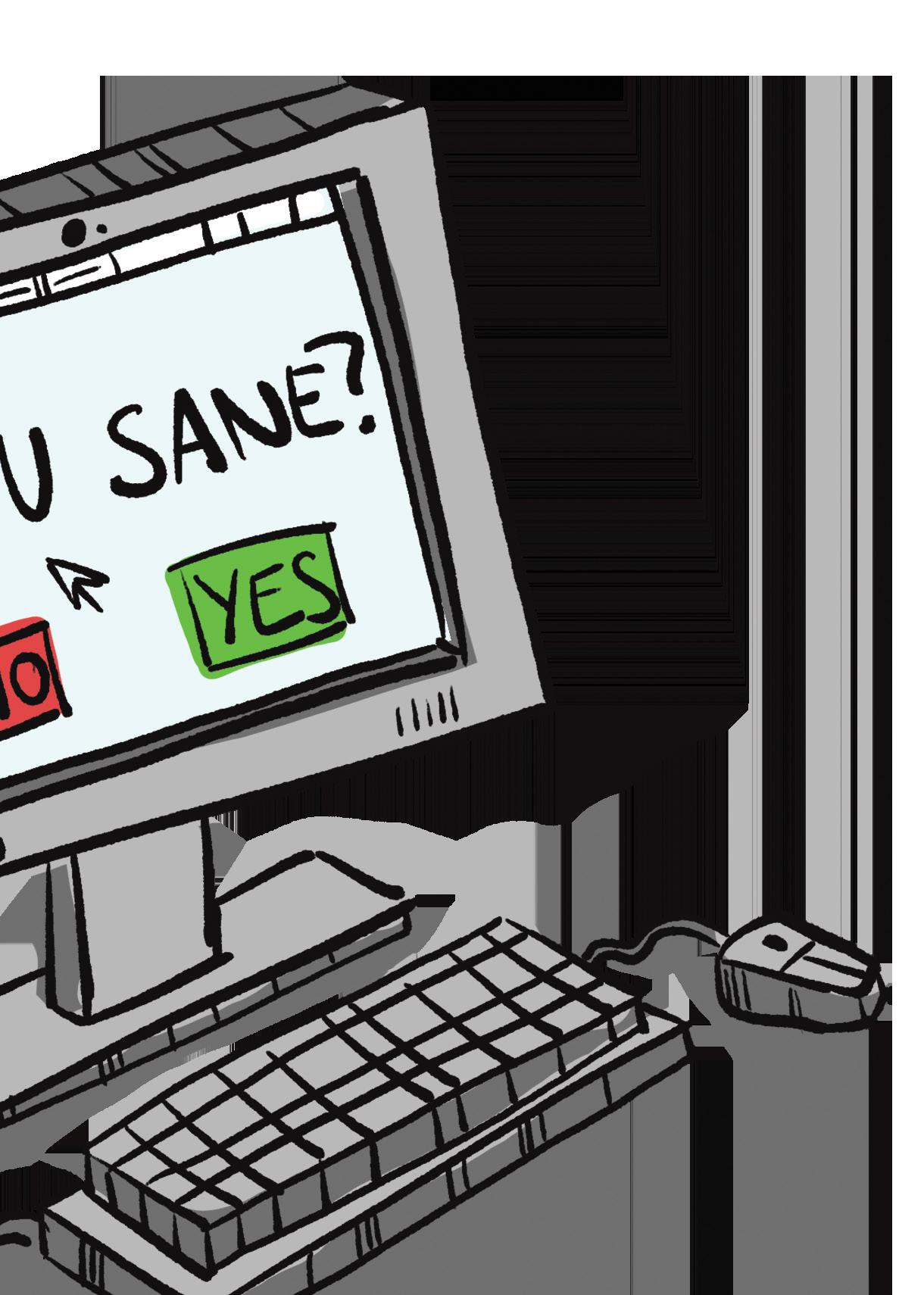
Some recruitment sites will specify which phase a trial is in. The trials that students are most likely to participate in are usually about testing how efficient a treatment is, rather than assessing its safety risks. Thankfully, this means students are less likely to have to choose between rent and a rash. Sure enough, neither Cassie nor Molly reported experiencing any unexpected side effects from their trials – beyond a desire to sign up for more.
There’s also a certain stigma tied to using your body for monetary gain. It’s often linked to desperation. This stigma, combined with distrust in science and healthcare, sees us telling our family we've been making bank “dog walking” instead of admitting we earned that $800 in a novel ketamine trial. The reality, Professor Ballantyne reminded us, is that health research depends on willing trial participants. By joining a clinical trial, you're contributing to advancements that can improve the lives of many. The COVID-19 needlelength trial Molly is part of aims to gain insights that could increase the effectiveness of the vaccine, both in Aotearoa and internationally. On top of a koha towards study-break treats, the opportunity to engage with complex research can sweeten the deal.
This is how Ava, a third-year Med student and self-proclaimed clinical trial enthusiast, ended up inhaling tuberculosis antibiotics for breakfast last week. Contrary to popular belief, tuberculosis isn’t an extinct medieval plague, but a serious respiratory disease that affects 300 people in Aotearoa each year. Ava’s helping researchers at Otago find more effective treatments for the disease, paid with $180 in supermarket vouchers in return. Fascinated by medical procedures, Ava sees clinical trials as a backstage pass to the research behind treatments she'll one day administer. Her excitement, like tuberculosis, was infectious. “I know my bone density, my lung function, and I’ve seen an ultrasound of my heart!” she excitedly told Critic. But Ava’s only human, and compensation for her time means she doesn’t have to worry about losing income by choosing the trial over other work. Though admirable, Ava might not be the majority. An anonymous submission to Critic reveals the lengths students might go to, at the cost of their health, purely for a bit of cash. The morning after a particularly wild, substance-fueled night out, one student was horrified to remember she'd signed up for a pharmaceutical trial that day – one that required a drug test. Needing the money, she desperately attempted to ‘flush’ what she’d taken from her system. In what she described as “a very short space of time” she ran 10km and chugged 14 litres of water. Pretty soon, she began to feel nauseous and entered a severe state of confusion. Along with the MDMA, she had also rid her body of a fair bit of sodium. Independent of any of the risks within the trial itself, she had given herself hyponatremia (dangerously low sodium levels in the blood). She was admitted to the hospital and, needless to say, didn’t make the trial.
Critic Te Ārohi asked Professor Ballantyne what researchers and students can do to avoid this relationship becoming a toxic one. Her answer was that taking extra care when determining participant compensation is one approach trialists can take. Researchers should stay sensitive to their participants' economic circumstances. Payment shouldn't be so low that it fails to cover associated costs such as travel expenses, time and risks. This ensures studies don’t reinforce social inequalities by underpaying students – confining them to struggle street. Nor should it be excessive, to the point where an individual’s ability to make a rational decision about their participation is compromised. This could constitute undue inducement. Overly attractive incentives also risk triggering deceptive behaviour in participants, tempting them to lie about their eligibility in pursuit of financial relief. This could be as simple as calling yourself a non-smoker when you buy durries on the occasional night out. Still, this is dangerous for the test subject and weakens the credibility of the study’s results.
To counter this, many Ōtepoti studies now leave out explicit payment figures to ensure moolah isn’t the main incentive.
Zentech loves an ominous “participants will be compensated for their time and inconvenience”. Figuring out the happy medium of payment rests with the trialists, which then must be approved by ethics committees and regulatory boards like the Health Research Council of New Zealand (HRC) and Medsafe (part of the Ministry of Health).
Confirming Critic’s suspicion, Ballantyne explained that ethical concerns could only arise if trialists consistently target students, knowing they’re more likely to overlook risks for cash. When lower-income groups continually shoulder the risks and burdens of clinical trials while wealthier individuals reap the benefits, it only deepens social inequalities—and starts sounding like the premise of a dystopian novel. However, Ballantyne told us it’s generally in the interest of researchers for their study participants to be evenly spread across the population, rather than a single very niche community. If an entire sample consists of 18-to-21-year-olds surviving on Smirnoff Ice and Mi Goreng, the findings may not accurately reflect the broader public – or those the treatment is ultimately designed to benefit. Reassuringly, Cassie and Molly told Critic that their pre-screenings featured participants ‘from all walks of life.’
Another way that clinical trialists protect their guinea pigs is to let them know exactly what to expect. Even if Molly hadn't read the consent form, researchers scheduled an hour-long phone call before the trial to explain the full protocol, and associated risks, and to answer any questions she had. This meant that going into the trial, she felt well-educated on its ins and outs. Cassie’s pre-screening process was similarly thorough. They repeatedly let her know that if she wanted to, she could exit this bizarre student side quest at any time.
At the end of the day, what you do with your body is ultimately your choice. So long as you feel safe, comfortable, and informed then clinical trials can be a good way to make a bit of extra cash, and contribute to research. It’s just like we were all taught in health class: know that if Zentech offers you a cup of tea, and you no longer want tea, that’s totally fine. Even if they’ve already made it for you, or you’ve already started drinking it. Maybe you have a personal mantra not to consume beverages prepared in buildings that look like aged crack dens. Bottom line: you don’t have to drink the tea.
*Name changed.
Zentech did not respond to request for comment in time for print.


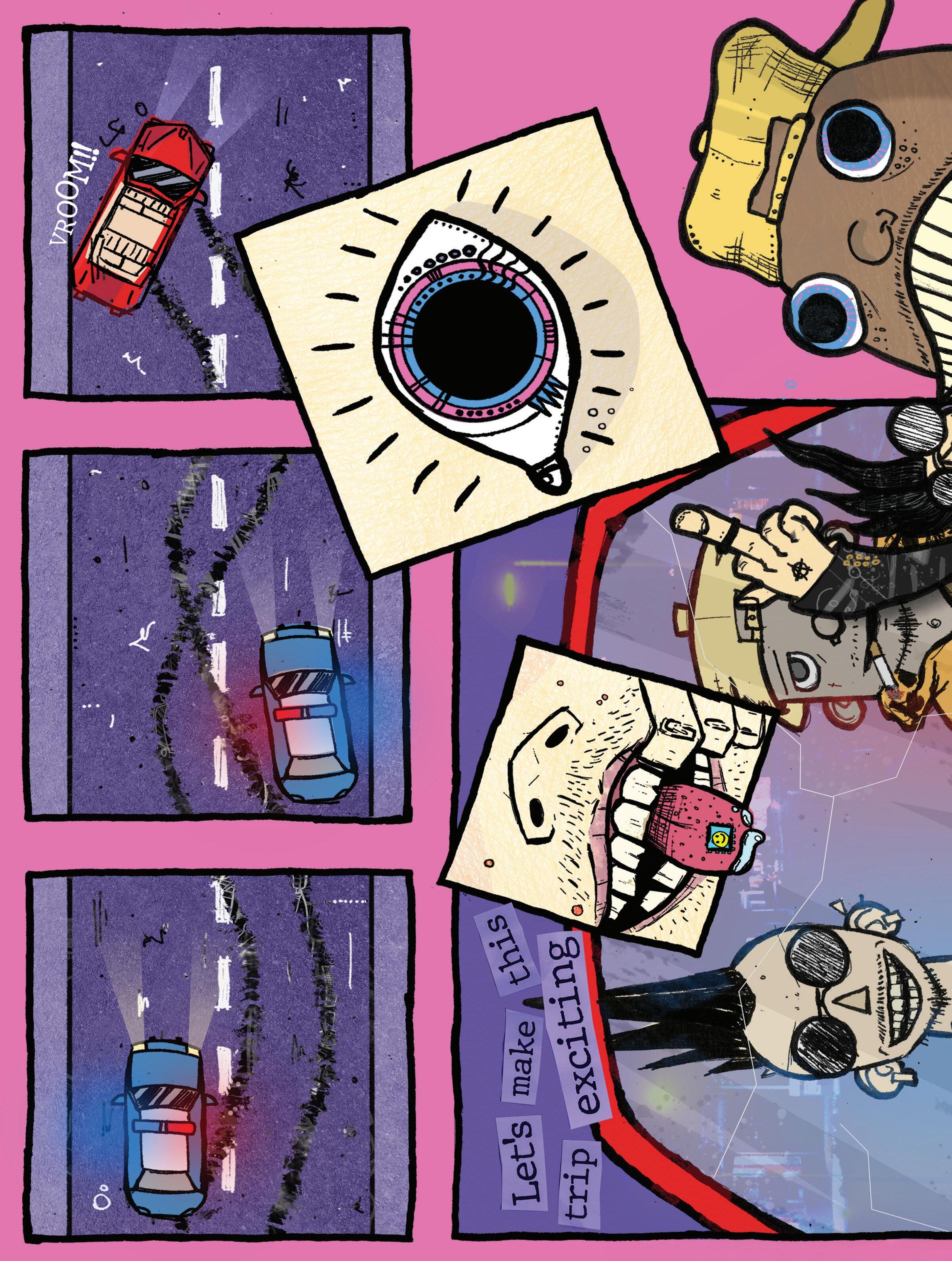
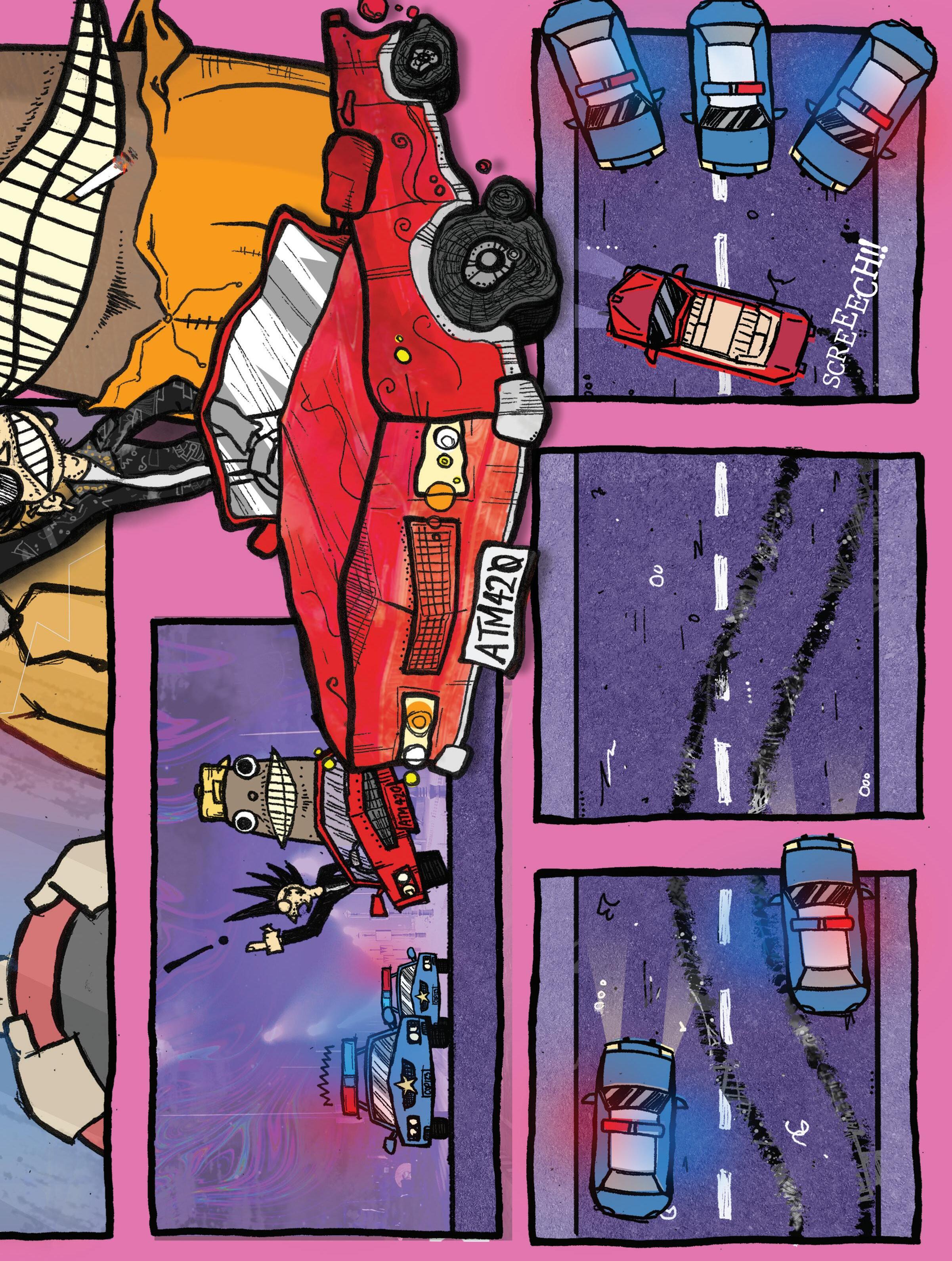

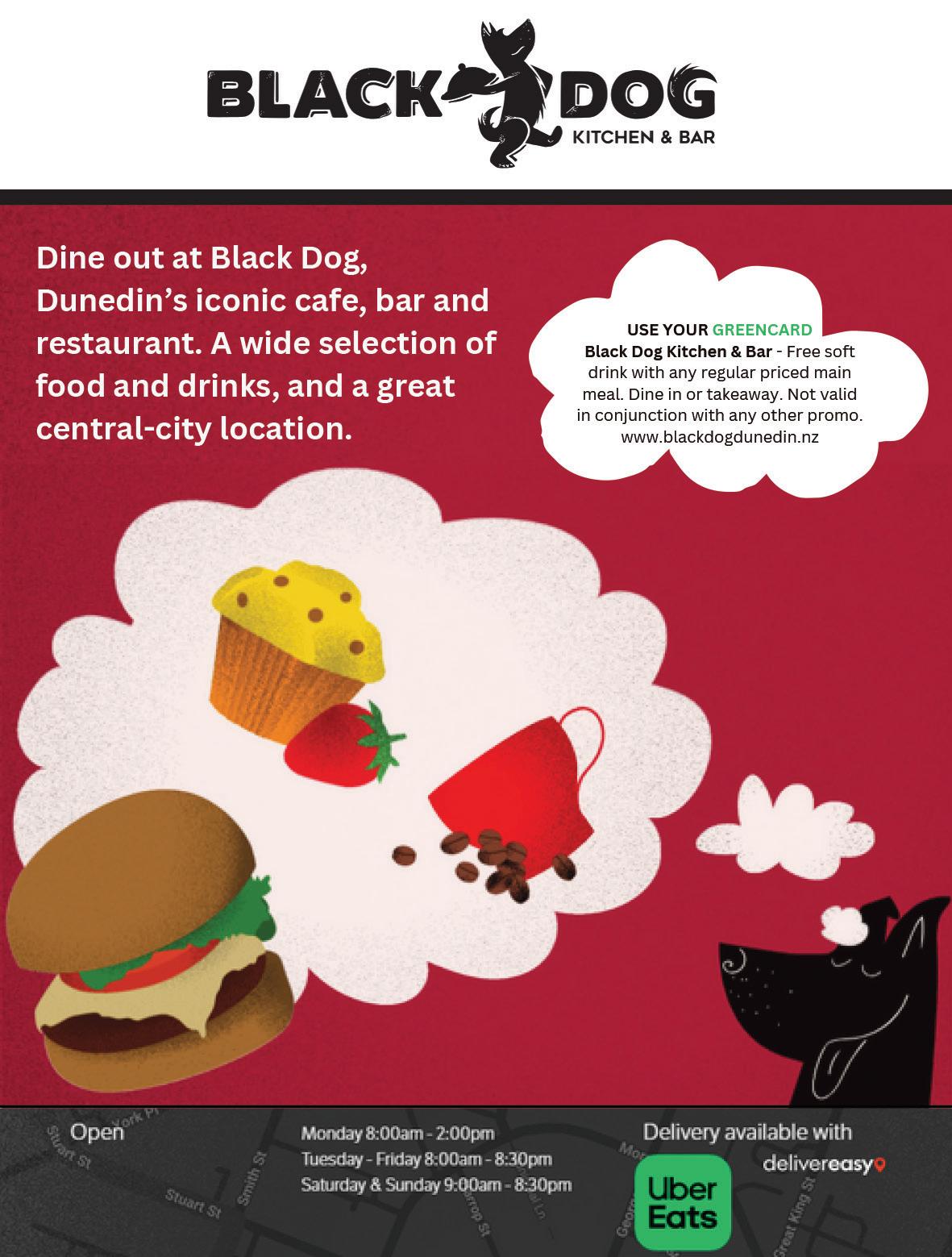



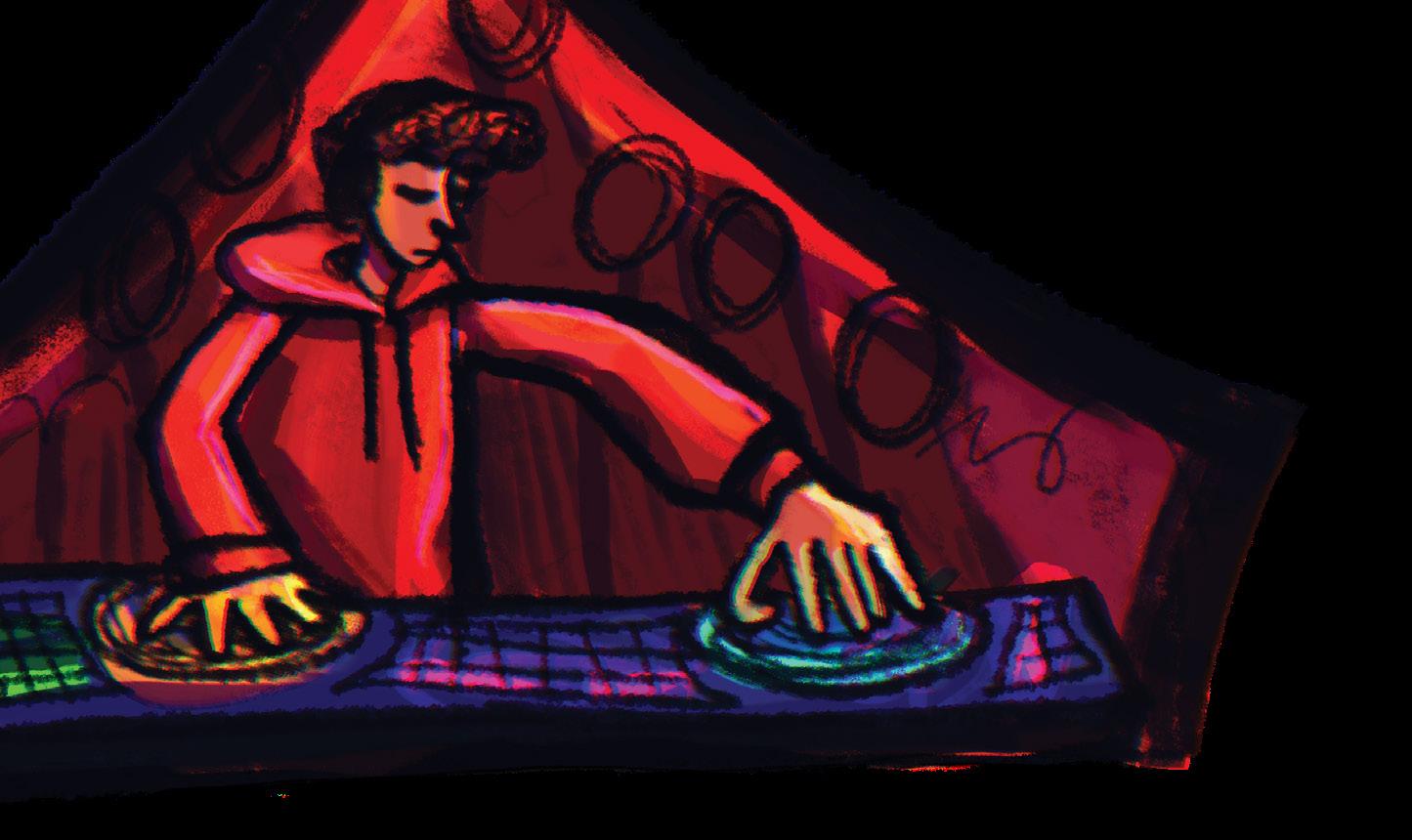
By Andrew Geddis University of
In Issue 3, Matilda Rumball-Smith and Iris Hehir provided an interesting, well-written, and thoughtful take on how student life currently feels on Castle St and environs (‘Big Red vs the Administration: Who Controls Castle?’). Reading it prompted a few personal thoughts and observations. These aren't meant to be criticisms or correctives; more a complementary individual perspective from someone who was a student here in the early ’90s and has been on staff since 2000. That doesn't make anything I say here "right", just differently informed. And it definitely isn't "the University's" view of things – it's mine alone.
First, the concept of "tradition" is an interesting one. While I'd argue that Matilda's article is an example of a real and valuable tradition – Critic Te Ārohi's 100 years of excellent writing that informs its readers and challenges them to think – there are others that look a bit more confected to me. For example, "couch burning" was a thing that really only happened for a decade or so in the 2010s. Yes, for a while it was very popular, then the Uni and fire service cracked down on it. Was that really an overreach into harmless hijinks? Couch burning actually is fucking dangerous (drunk people jumping over what really are burning balls of petrochemicals is a recipe for disaster). It badly damages the road that the couch sits on, which costs a shit-ton to fix up. And, when it became "normal" to set stuff on fire, people started doing it to couches that were sitting on flat balconies... which isn't great.
So, the idea that couches always got burned by your forebears just isn't true; and, during the comparatively short period it did get done, it wasn't really the sort of "no harm, no foul" activity you might imagine. This is the case, I suspect, for many things touted as being important but now sadly ended "traditions" of life at Otago. On that topic, flat initiations are another thing that are a comparatively recent development – just because breathas say, "But it's what always happens," doesn't add any merit to them. As a collective, you really need to ask yourselves questions about what you demand your peers have to do in order to be a part of your culture. Is it valuable to your common life? What harm does it impose on those forced into participating by your invoking "tradition"? Does it build the sort of connections that are meaningful and healthy? Or, is it just continuing to act out the practices of dominance and privilege that we learned at our high schools and are unable to move past?
Second, to my eyes the biggest change has been in the size of the Uni and the wholescale "ghettoisation" (problematic term, I know) of North Dunedin. In the early '90s I studied with around 8,000 –10,000 others enrolled at Otago. Now the roll is way over twice that amount. And these extra bodies have been stuffed into the North Dunedin quarter, which has intensified in population while driving out all the non-student inhabitants. Which means you've now got 18 to 21-year-olds making the place entirely their own according to their own social mores.
That's all fine. There's a joyous freedom in being surrounded by your own and feeling able to live your life in a spirit of YOLO freedom. At least, it's all fine until Sophia Christani tragically dies under a pile of bodies, or a balcony collapses at an impromptu Six60 gig and a young woman is left with serious spinal injuries. That's something the University as an institution has both moral and practical reasons to care about. After all, it's the University that provides the reason for you all being here – for it to just bank your fees but then say it's not its concern what happens to you outside the lecture halls is
intolerable. The University is not the same as your phone provider or your supermarket. You don't exist in a service-for-fee relationship with it. Rather, the University is a community. It is a place of reciprocal duties. And that means, for better or worse, it has to care about the welfare of you and those like you and take action to uphold that.
Furthermore, if the reputation of Otago becomes dominated by a "breathas on the piss" image then parents of Auckland students (as well as some Auckland students themselves, who want something more from their Uni experience than getting blitzed) start saying "nope" to Otago. Even a small dip in those enrollments collapses the Uni's finances and means departments have to close. Hence, the Code of Conduct. Campus Watch. Video cameras. The "requirement” (non-enforceable, but scary) to register your flat party and abide by police demands. And so on, and so on. I'm not saying all of these developments are okay, or that there haven't been problems with how the University has acted at times. But, equally, you've got to see what has been put in place against these sorts of concerns and pressures.
All this means that any idea that things could be just left "like they were back in the day" is, unfortunately, wishful thinking. You'd need to return the Uni to being a far more selective institution with far fewer people in it – which has real equity issues. You'd need to pepper North Dunedin streets with families who dilute the "studentville" nature of life there. And, you'd need to create collective spaces where students can meet and socialise without externalising the impacts. So, "back in the day" there were a halfdozen pubs near the campus, each with their own "vibe" so you could decide what experience you wanted. Plus regular events –bands playing, etc. – put on in the Main Common Room-Union Hall. Plus (and this really is a BIG change) there was a broader sense of collective student life. Things like protests against student fees meant that we didn't just see our "Uni experience" as being in terms of the parties we went to.
In that sort of environment, the Uni can (literally) afford to cast much more of a blind eye to whatever students get up to. But when the overpowering effect of North Dunedin breatha culture becomes a reason that more people start saying "no" to Otago than "yes" (and believe me, the Uni surveys the shit out of this sort of thing), then of course the Uni has to do something about it. Or else, there will be no Uni, because we live and die based on student numbers. Unfortunately, that might just be a part of the general enshittification* of the world – but the answer isn't to hearken back to "the good old days"; instead, it's to make your own new way of doing things.
Anyway – like I said in my introduction, these are just some comments and observations from my (aged) perspective rather than anything meant as a critique. I'm glad questions are being asked and the limits placed on student life are being probed. That, above all else, is an Otago tradition that should never be allowed to die.
*Enshittification (noun) describes the process by which businesses or digital platforms degrade over time – initially prioritising a usercentric experience (in this metaphor, students and staff) before shifting toward bureaucratic, profit-focused interests.
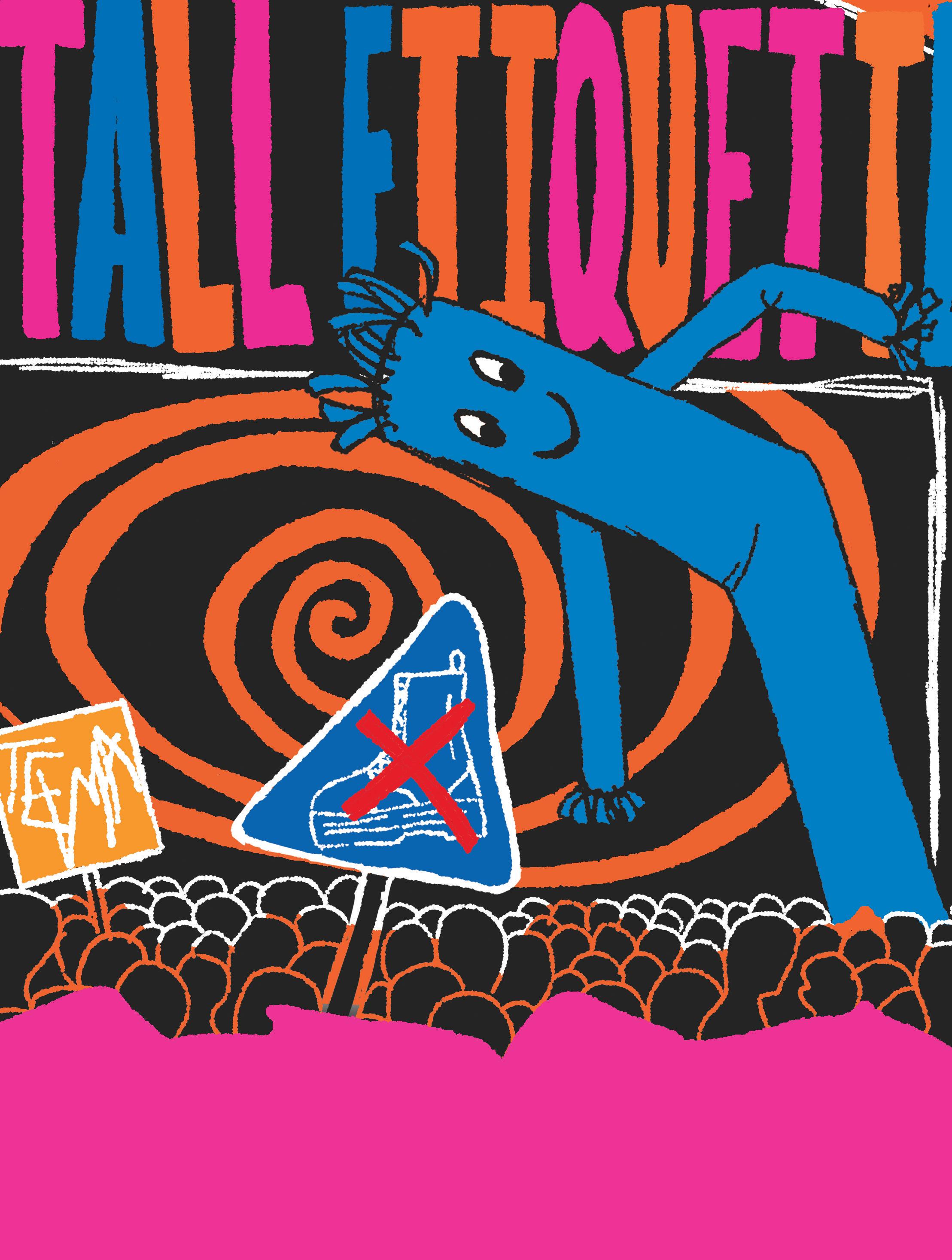
If you’ve attended Electric Ave, Six60 or one of the first few Pint Nights, you would have noticed some pretty appalling crowd etiquette. You don’t need to part a friend group like the Red Sea to get to the front. In a mosh situation, tall people must act very carefully. Sometimes you don't want to stand out, but it feels like those built like the Burj Khalifa are held to a higher standard than the rest.
This article is an unbiased account from someone who is 6’3” (and single and a feminist). Because of my height, I
often get some filthy looks when getting dragged around the mosh by my pocket-sized pals. It is easy to feel guilty having the view of the stage all for myself, but I shouldn't pity the small. It's not my fault that they didn't eat their broccoli as a child. The best we can do is try to reduce the harm of our slender builds. I’ve tried out a few tactics to stay respectful in crowds, some better than others. Let this be a guide, for all those who feel as tall as the Richardson, to not let height get in the way of your big night out.
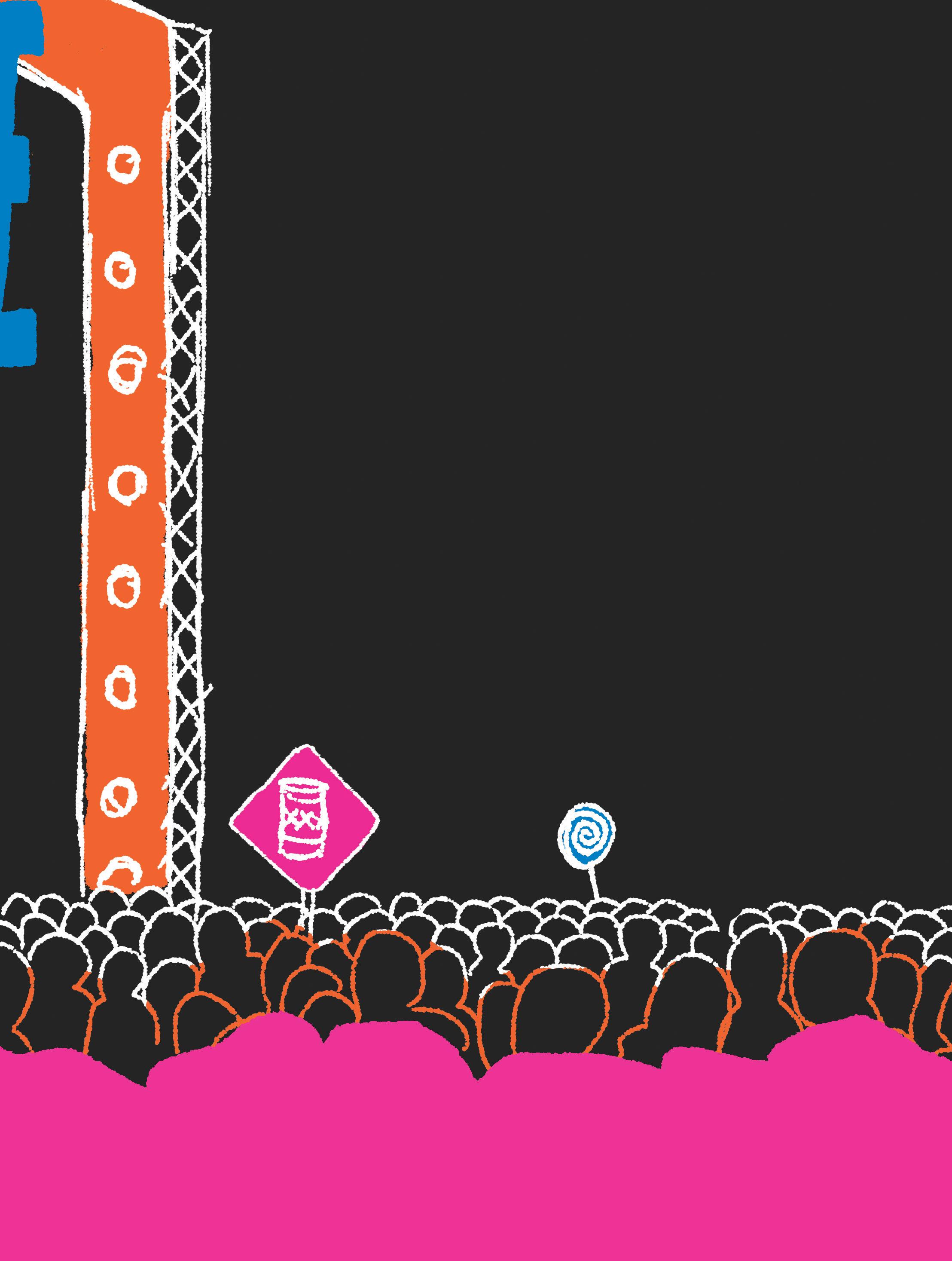
Yes I know that you look slay, but tonight is time to put those platform Docs away. There is no reason to add any additional height. Taking height-minimising actions should be in your highest interest. If you are planning to head right on up into the mosh, then any shoes with added soul are a no-go. The person behind you will feel no sympathy.
Sacrifice: Style Effectiveness: 9/10
Doing a little side-to-side shuffle can allow everyone behind you to take turns in getting a glimpse of who’s on stage. No, this does not mean that you should whip out your best impression of a car dealership inflatable. Make sure that those hips are somewhat contained, to save the person behind you from a non-consensual lap dance.
Sacrifice: Nada Effectiveness: 8/10
CREATE
This one happens naturally. Often a group will nominate their lengthiest character to stand behind the rest of the giants. This process repeats until you have an entire line of tall people. Double points if it is in height-ascending order. The goal is to concentrate all of the little munchkins into one big clump. This is the closest thing to equality that you will find in U-Bar. An act that will make Karl Marx smile.
Sacrifice: Your privilege Effectiveness: 10/10
HAVE THE BEST TIME OF YOUR LIFE:
If you want that spot near the front, you have to earn it. There is nothing worse than being stuck behind an emotionally joyless giant while your favourite artist is playing. If you want to get somewhere in life, you have to go work for it. If you want to keep your spot in the mosh, you better be having the best fucking time of your life. No one can complain about missing out on the view when someone more deserving has it.
Sacrifice: Your 9am lecture Effectiveness: Who cares/10
DANCE MOVES TO HELP YOU LOSE A FEW INCHES:
T-Pain was onto something when he said, “Shawty
got low, low, low, low, low, low, low, low.” Maybe Shawty was tall. Myself and T-Pain recommend whipping out a few height-limiting dance moves to give the vertically-challenged a few more opportunities to get a glimpse of the stage. Thankfully, there are a surprising amount of dance moves that involve a squat. Throwing down a few slut drops is always a good option. The Rasputin never fails to be a hit, likewise with the worm, and if you're feeling confident, busting out into a low twerk also does the job. In case you left your boogie shoes at home, you can always try the stanky leg. This involves bending one knee at a time to shift your weight from side to side. This works if you’d like to sustain a diminished height throughout the night. Beware that the above options will likely cause postural issues. Make sure you warm up (with an Irish jig) before trying out any of these moves.
Sacrifice: Your knees
Effectiveness: 5/10, only momentary relief
LET SOMEONE ONTO YOUR SHOULDERS:
Sometimes you may spot one of your fun-sized friends jumping like a grasshopper to catch a glimpse of the stage. Feel free to kneel in solidarity and let them climb onto your shoulders. Your little friend has gone from 2x zoom to 0.5 mode in a single moment. While it may be unpleasurable to have your head sandwiched between two thighs, be assured that the person above will be having the time of their life. Be prepared to get a finger wag from the seccy’s (AKA fun police). Just don’t be too disheartened that no one ever wants to have you on their shoulders, you get a good enough view anyway.
Sacrifice: Your dignity Effectiveness: 8/10
PROFUSELY
Apologising is a great way to act like you care without actually doing anything to help. After pushing your way into a nuts to butts crowd, you may feel the pressure of a few dirty looks. The conundrum then is, how do you stop feeling guilty without forfeiting the spot you shoved your way into? The easiest solution is to shower everyone within earshot with apologies. The only person that this technique pleases is yourself. Beware, one half hearted apology too many could lead to a punch in the face (thankfully the worst they can do is an uppercut).
Sacrifice: Everyone Effectiveness: 0/10


As a child, my parents were Labour voters and to me that seemed like the moral choice. John Key’s National government at the time did not have their best interests at heart as they prioritised wealth over wellbeing. New Zealand First, headed at the time by an old Winston Peters, appealed more to my grandparents. Meanwhile, Act was on no one's radar; it was that space filled by centrist Peter Dunne flip-flopping for power. This meant in my youth I was a Labour supporter. The parties I support now, Greens and Māori, were not something younger me considered for when I would hypothetically vote. This was due to the lack of Māori presence in Dunedin at the time, and Greens’ love for nature did not appeal to me at a time where I did not understand what climate change was. As I grew older, I saw the cracks in the system but there was one politician using the kintsugi method to fill those cracks with gold: Chlöe Swarbrick.
Once in high school, where politics start to matter as you start to matter in society, all you see is 120 seats filled with old men and women. You don’t feel represented or spoken for because who would understand you? A young Greens MP from Auckland would. She talks like you, about you, and more importantly to you. She wants to understand what issues you face in your everyday life and how she can fix it on a national level. Through the last few election cycles where she wasn’t even leader for her party, she was still one of the most preferred Prime Ministers for New Zealand. You think Jacinda Adern is great but you want the “woke lesbö”. At least, for a certain point in time.
It is often said that you should not idolise politicians, but with Chlöe it was hard not to. The charisma of Barack Obama with the politics of Bernie Sanders, which is part of the greater problem. Chris "Chippy" Hipkins recently made an appearance in Dunedin to adoring supporters. I had previously asked him a question in 2022, to which I got a very apolitical answer that took no accountability. But that's Labour, not the progressive star of the Green Party. I met her in 2023 in the Radio One office, where I was volunteering at the time, and tried not to hassle her with my admiration, especially her being an openly queer politician. Instead we bonded over both being Cancers. Within the one and a half years between that interaction and my most recent meeting with her when she rocked up to the Critic office with Francesco Hernandez in O-Week, my politics had radicalised. Meeting new people and reading more has opened up my mind on how I want current New Zealand society to operate. Simply put: it’s not working right now. Chlöe agrees with me. Kind of.
I was excited to hear Chlöe’s views since she’s now become the Co-leader of the Greens. But after a long conversation with me and our editor Nina, I felt disappointed. When I mentioned I was radicalised, I meant it. The conversation turned towards the wealth disparity within the country and the world, and I admitted my admiration for Luigi Mangione. I didn’t fully advocate political violence; but I wasn’t fully against it, either. Whether for better or for worse, all revolution means an uprising from the disenfranchised
that results in violence. This is shown by the civil rights movement in the 1960s, a brick being thrown at Stonewall, and, most infamously, the French Revolution. When 10% of the world owns 85% of the wealth, it makes sense that people want heads to roll. From my perspective, there has not been a middle class in New Zealand since Rogernomics in the ‘80s. There is only rich and poor. This divide often isn’t focused on due to other forms of politics. Malcolm X and Martin Luther King frequently expressed displeasure with the wealth gap in America, as well as racial injustice. MLK used tactical protests to attack the pockets of white businesses. The Black Panthers in many American states had free breakfast programs for children. These free breakfasts even involved local gangs to help stop gang activity but the programme stopped due to FBI raids, who claimed the organisation was indoctrinating kids. Infamously, many peaceful marches held by MLK ended in violence when cops would use dog units and firehoses to stop protestors.
These are two examples of movements trying to remove inequality and poverty from society in peaceful ways but, due to the capitalist and inherently white supremacist and patriarchal systems in place, were met with violence. You may dispute that this is not the case in New Zealand but it is abundantly clear we are closer to America than we may think. Whether through Luxon’s boot camps that plan to stop youth crime or Seymour’s Treaty Principles Bill, these right-wing politicians are implementing action reminiscent of Regan, Bush and Trump – even if it is in a more subdued way. Chlöe of course agrees with this, but she also wants to fix the system, which I do not believe is possible. As a non-binary person that also suffers from mental health issues, the system hates me. It was designed for me to fail, as is the case for every other marginalised group. This is why I personally advocate for burning society to the ground and rebuilding from there. New carpet doesn’t fix the foundation of the house.
Unfortunately, Chlöe is still a politician so she is fighting for the same system. Her counter-argument offered to me is that when society is burnt it will be awful for those who are disabled as well other marginalised groups. While true, the disabled community is not doing too well anyways – and it doesn’t seem like it will get better when you still have billionaires, corporations, and politicians actively destroying the world. At this point, policy is too slow of a process to save a world that is burning. There needs to be change and it needs to happen now.
I still think Chlöe is a great person, especially off the record, but while she remains a politician who wants to work with politicians who still view a majority of the country as less than human, little will change. It’s a reminder that real change doesn't happen through legislation, it happens through community. People are the power, but there are people in the way. It depends what you want to do about it but, in my opinion, arguing in a building for hours on end isn’t the way.

BrainRot scrollingInstagramReels
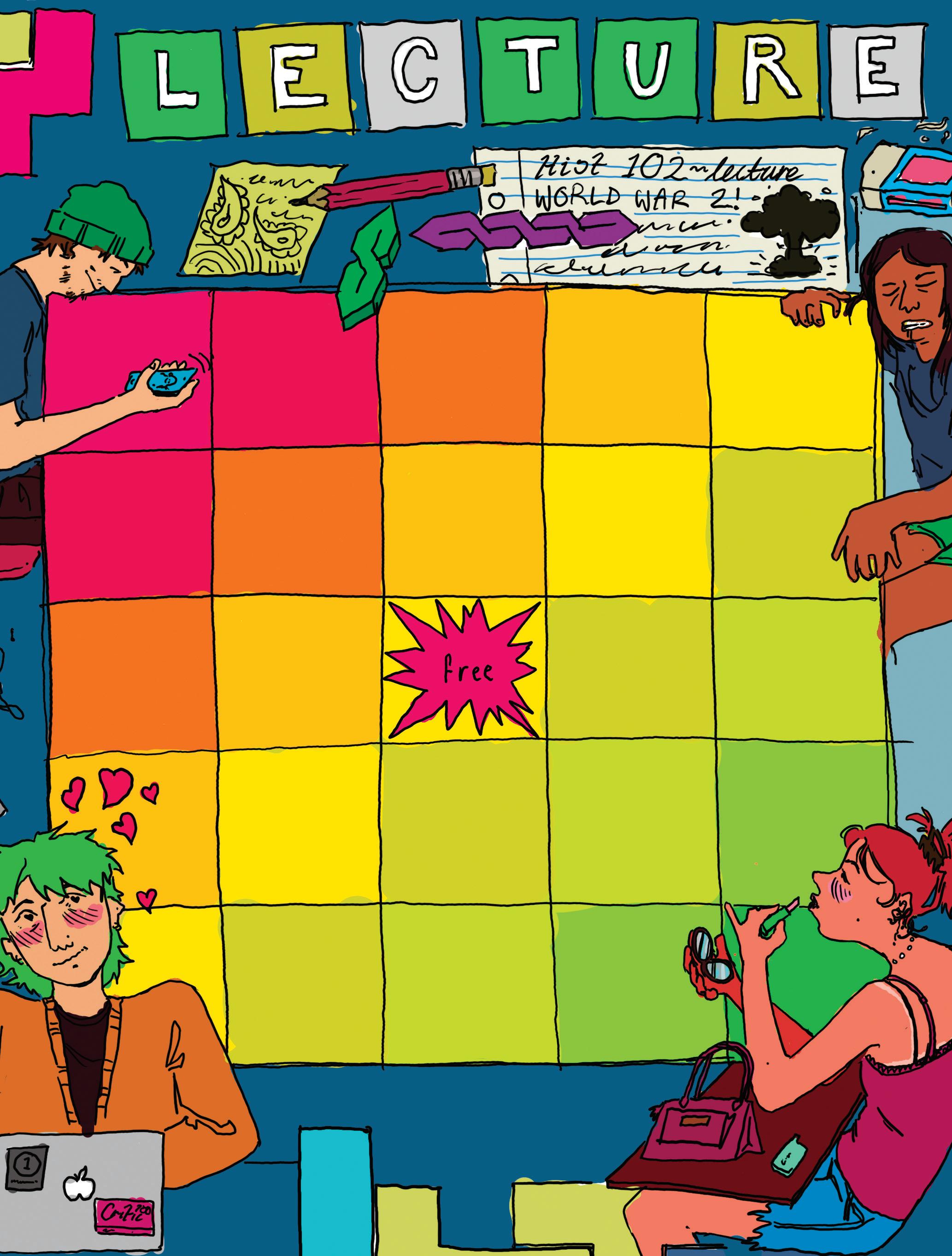
Finish and Forget the accidental Porn-hub opening computer-smash combo!
Smelt and Dealt a vocal, potent fart
GamerSweatypulling Pokémoncards
Sheatha doing a makeup routine
Erm… Actually someone tries to correct the lecturer
The Opp your lecture theatre opp pulls up
tetrisgamer
Locked In studying a different paper to the one you’re in
The Influencer taking selfies in class, bonus if you’re in backgroundthe
Cough Criminal coughing throughout a lecture
The Perseverer chronically late (by at least 15 minutes)
DoodleDoer doodling instead of notes even though they brought paper
Cotton-On Crackhead online shopping
The Hat Guy wearing a hat inside
Passed-OutAnd-BarelyPassing asleep in a lecture (real)
The Lover your pullstheatrelecturecrush up
ButterFingers dropping something loudly
The headMusiclistens to their music too loud
All Wake No Bake sober at an 8am lecture
Woke Liberal lecturer references a meme
Wordle EnthusiastWordleplayingthedaily
BoyMummy’s texting a relative
Real One actually taking notes
Lectures can be fucking boring. This could be because you’re doing a degree you hate, your lecturer has the worst voice in the world or says “um” too much. Or it could just be a ceebs that day. Critic Te Ārohi has now invented a solution for when you have run out of Cool Maths Games: Lecture Theatre Bingo. You can find out if your class is full of Neutral Evil (Law), Lawful Good (theatre) or True Neutral (Surveying). Have fun, there are no prizes, leave us alone.





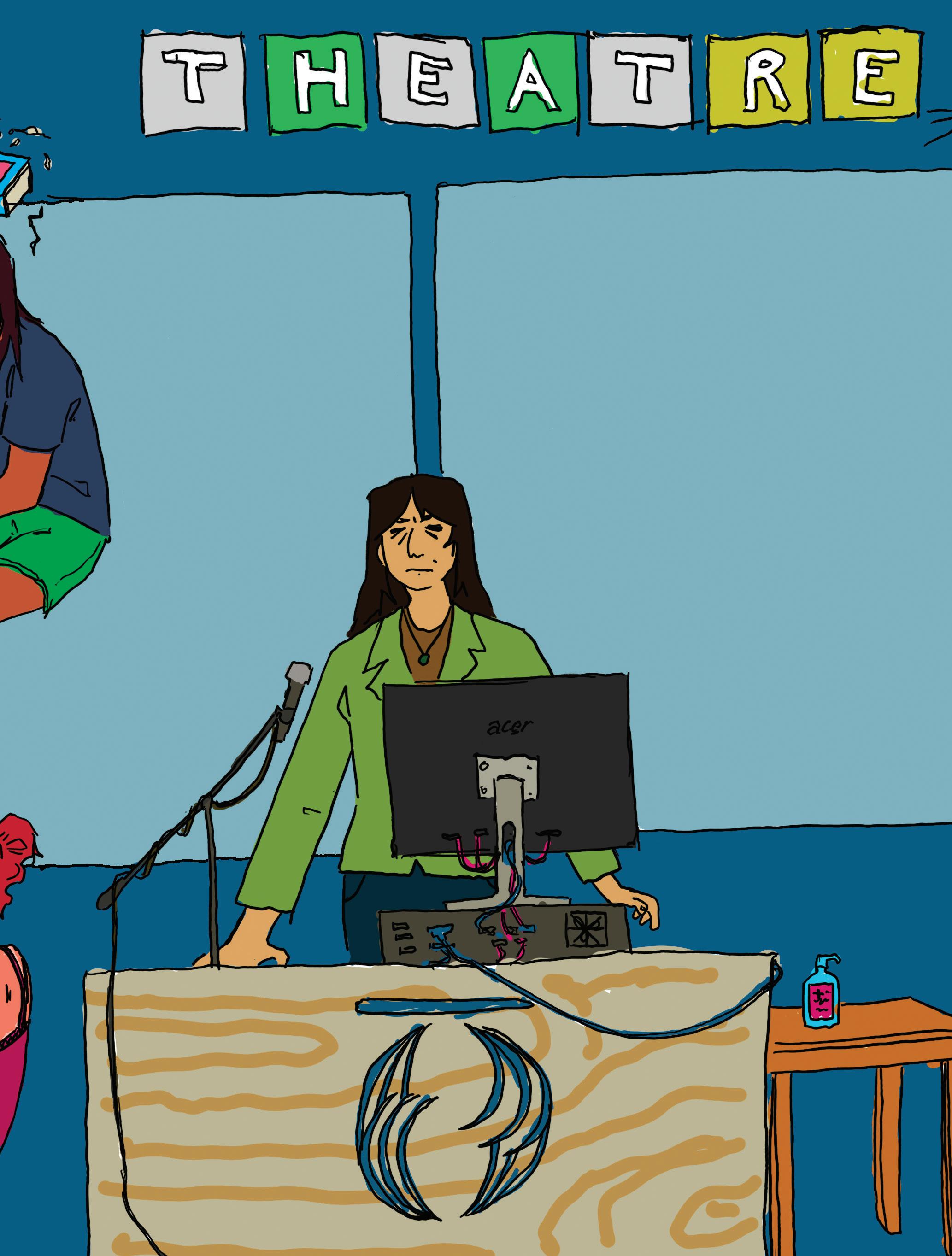

FROM
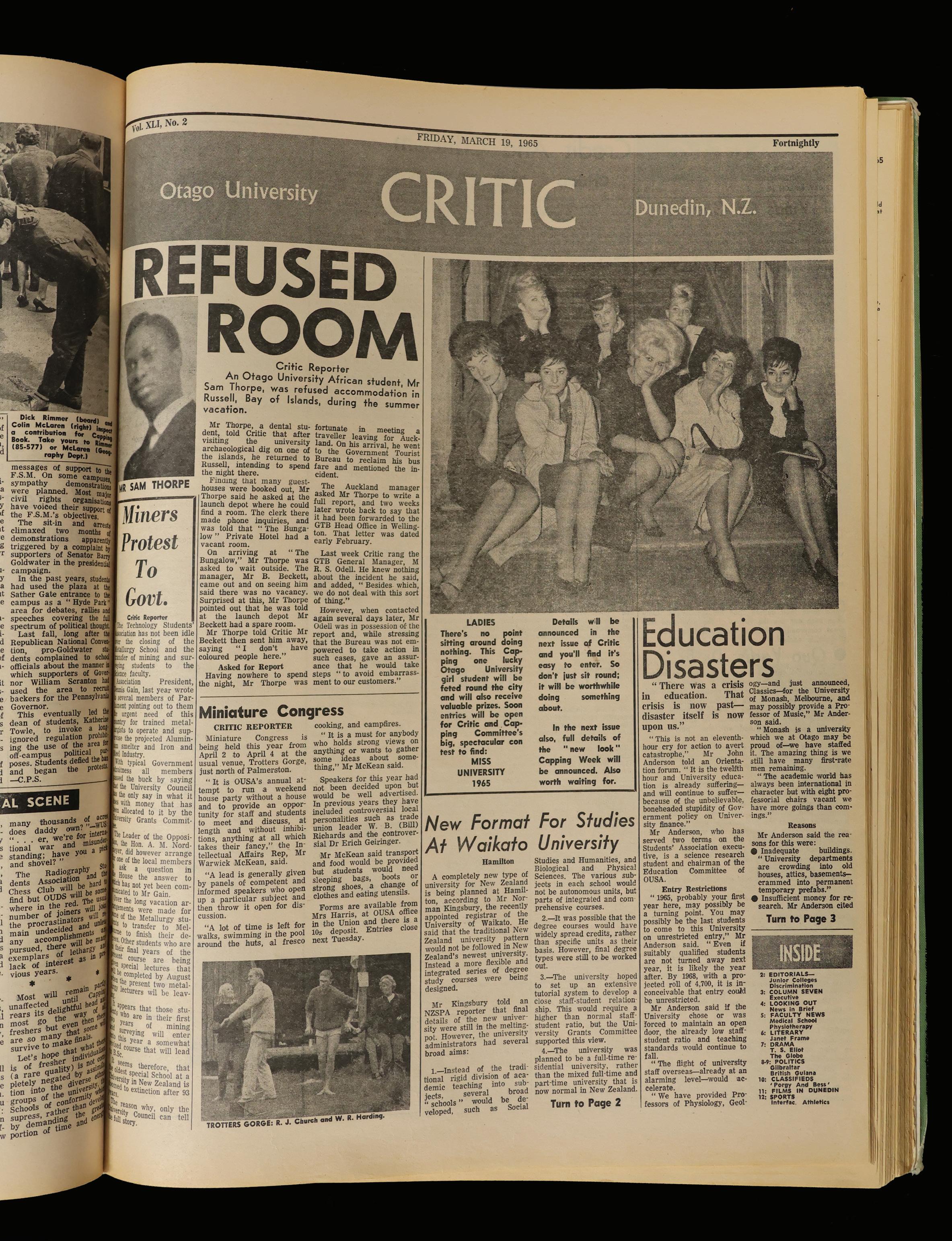
60 YEARS AGO - MARCH 19, 1965

Special thanks to our Critic birthday sponsors*! If you would like to be involved in the Critic Te Ārohi centenary book project, make a pledge by scanning the QR code or get in touch with 100@critic. co.nz – be part of history.
Zane Pocock
Liam White
Sinead Gill
Zachary James Hoffman
Henessey Griffiths
Imogene Felton
Miffy stuart
George DeMarco
Flynn Robson
Elliot Weir
Quintin Jane
Bridie Lloydd
Denzel Chung
Nina Brown
Eden Bennett
Olivia Restieaux
Bonnie Harrison
Caitlin Knox
Annabelle Parata Vaughan
Ezra Dempsey
Emily Taylor
Lily Knowles
Lucy Leadbeater
Taine Duthie
Jimmy Langrish
Mario Girardet
Francisco Bagkus
Hernandez
Tara Shepherd
Sophia King
Maddie Hall
Romy Wales
Hanna Varrs
Accalia Guilford
Connor Moffat
Gemma McKinney
Harrison
Lia
Brynn McBurney
Helena Hornbacher
Rose Mills
Brooke Henderson
DIVISION OF EXTERNAL ENGAGEMENT
Sebastian Rhind
Oliver Simcock Smith
Emma Kehely
Ella Grayson
Grace Thompson
Tamsin McCallum
Rosemary Overell
Jack Ure
Jamison White
Ryan and Amanda Brown
Isaac Douglas
George Bysouth
George Kennedy Hargood
Gryffin Blockley
Alix Long
Maia Ingoe
Paris Henderson
Aletheia Goh
Sara Luzia Rothwell
Jack Fraser
Pippa Thompson
Josh Martel
Emma Westenra
Finn Cattaway
Lucy Mckenzie
Kelly Ngan
Daniel Leamy
Natasha Howie
Sophia Carter Peters
Jamiema Lorimer
Jonathan McCabe
Reuben Ballara
Animesh Tripathi
Kelly Stitely
Matilda Rumball-Smith
*Note: This list excludes those who have made direct donations to OUSA outside of the pledge form. We love and appreciate you too xo
MATT JOE GOW ERRICK'S Tickets from moshtix.co.nz. 8pm.
DIVER Tickets from undertheradar. co.nz. 8pm.
FRYATT DIY SKATE JAM
FRYATT ST DIY SKATEPARK Featuring DJs and MC Mic Sure. 1-4pm. All ages.
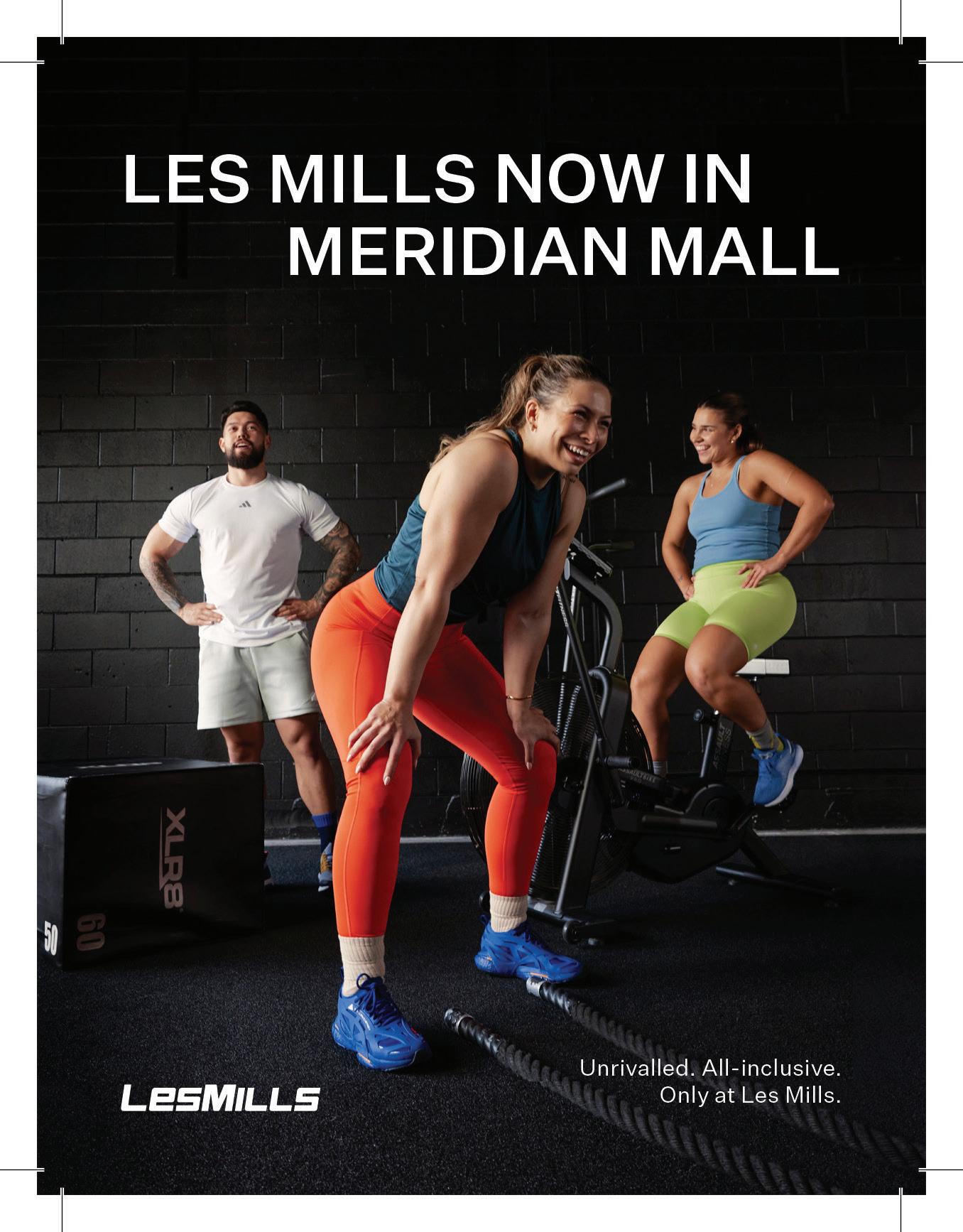
91 CLUB KARAOKE AND CLUB NIGHT FEATURE EVENT @ U BAR w/ DJs RUG & ROO. Tickets from undertheradar.co.nz. 8.30pm. BASELINE FESTIVAL LOGAN PARK Featuring Kings Of The Rollers w/ Inja (UK), Gray, Rova, Savage, 6 Sense, Bontempo, Osmosis Jones, Paige Julia, C-Teez, Damage Control, Hatrick, Mantis b2b Ruinz, Nörty Club Collective, and more. Tickets from flicket.co.nz. 2pm.
HARSH NOISE SOFT COFFEE 3 RDC ESPRESSO Featuring Tara Sharp, Post Pooman, L$D Fundraiser, and Youbeepastablaster. 12pm. Koha entry. All ages.



DAVE FLYNN - CELTIC GUITAR JOURNEY DUNEDIN FOLK CLUB 7pm. $10 members / $15 non-members. All ages.

Fun Bucket exclusively plays every Thursday for Pequeño's Jazz Nights. After paying the $20 entry fee, you'll be welcomed with a complimentary cocktail and, squeezed into the chandelier-lit corner, you'll find the band. The intimate group of spectators are found eagerly surrounding the group but beware, this audience does not hold back on the dance floor. A warm salty scent of sweat is certain to swallow the space by the end of the night, testament to the unrestrained dancing that matches the funkadelic grooves.
During the show's halftime break, Critic Te Ārohi spoke to the band – Ryan, the band's frontman/guitarist and their drummer, Jack. Those still stuck in line watched us with envy, hoping someone would leave so that they could take their place. Fun Bucket is constantly changing shape and style. Ryan tells Critic that "people come and go while the band constantly mutates." This means that you never know what you’re going to get when you turn up to jazz night.
Like Trisha Paytas, the band has gone through many rebrands. The oldest member in the group, Peter, said that the band was called Chocolate when he first joined 20 years ago. Since then it’s been known as Sexy Healy and the Funk Soul Brothers. Jack says that they go by “whatever Andy calls [them] on the night.” But Fun Bucket seems to be one that has stuck around for the longest.
Though the event is named Jazz Night, the music is not distinctly jazz. The group typically launches into the chorus of a song before splintering off into a journey of solos, with each musician pushing the sound as far as it can go. "We often forget what song we're in," laughs Ryan. Notable covers in Fun Bucket's rotation are their versions of Bill Withers’ Lovely Day, The Meters' Cissy Strut and Kool & The Gang's Get Down on It. Ryan jokes that they should

ByJonathanMcCabe
call it "Improvisation Night," but he doubts anyone would get it. Instead, he’s sure people will just assume they’re a bunch of "theatre kids doing some weird Shakespearean shit." Jack finds that playing together on stage is "like having a conversation through music," which in a sense is the essence of jazz. Imperfections are everywhere but "the flaws are what make it human," Jack humbly adds.
Jack mentions that Behavioural Economics Professor Nathan Berg has been known to make an occasional appearance on the bass guitar. The last time he performed, the lecturer’s finger "ripped open and bled all over the bass." Jack continues in awe, "It looks like he's in a state of ecstasy when he's on stage, he puts everything into it."
While shuffling our way through the crowd trying to get back to the stage, Ryan made it clear that Fun Bucket "only exists in this space." He gloats that they've never done a gig anywhere else as this band. "Some people have asked us to, but I've just quoted them an insane amount, so it's never happened." They seem to like it that way. Their exclusivity adds to the band's mystique. The only way to understand their sound is to come in person and find out. Jack describes the rotation of performers as a small "pocket of musicians" that "all have a part in different projects" across Dunedin. According to Jack, the life of being an artist in Ōtepoti is a mix of "playing music, having fun, drinking beer, and getting paid."
If you would like to witness Fun Bucket for yourself, check out @pequenomixologydunedin on Instagram to make sure they're playing.


“Reasonably Concerned”
By Jordan Irvine
Even though Nicolas Cage’s voice was odd in Peggy Sue, it is nothing compared to Vampire’s Kiss. A film that uses the vampire as a metaphor for lust and greed, the Cage is unhinged. Not only is the voice weird but so is his hair, his mannerisms, his cadence – his everything. He angrily yells out the alphabet in front of his psychiatrist. He speaks quietly before exploding on the next word for no reason. This film is where the meme comes from – the 2010 era top text bottom text ones. He acts like Jim Carrey being Nicolas Cage. Vampire’s Kiss is the first film that shows who the Cage is. It goes from regular old Nic to a crazed lunatic who we have all come to love. He’s insane for choosing to act the character this way. I don’t know if there is a right way to act the part of a man who believes he has turned into a vampire, but the Cage took some creative licence to say the least. Christian Bale used this as inspiration for Patrick Bateman in American Psycho (IMDB it, trust me).
Never on Tuesday has a 30-second Cage appearance at the ten-minute mark where he drives a nice car while wearing a Gru-like prosthetic, then asks if “everyone is okay” before driving away again. The rest of the film is softcore porn and homophobic to lesbians. Time to Kill is an Italian war drama set in Ethiopia and when I found the film it was dubbed in Italian. Thanks to Reddit, I found the film with English audio. The Cage makes a chameleon smoke a cigarette. He then rapes a native girl and accidentally kills her shooting at a hyena. He believes he caught leprosy from her and panics. That’s it. His acting is not weird enough to keep you interested. Not essential watching, especially considering the awful content of the movie that was, to say the least, awkward to view. This seems to be the last of the period pieces that the Cage frequently chose to act in throughout the ‘80s. Thank God. I now move into a new decade with Wild at Heart.
I managed to drag Evie back into the Cage due to the film’s promising lineup including the Cage, Laura Dern, Willem Dafoe and the fact it was directed by David Lynch. Unfortunately, apart from a good couple of scenes and performances, I found it rather uninteresting at times. Cage did sing Elvis though so that was fun. Evie declared she would not enter the Cage again. We shall see. Sam Soppet, former Critic videographer, was briefly a part of the Cage. He will be back for the Ghost Rider films where he had his “G.O.A.T. streak”. Fire Birds is Nic’s first movie as an action star and it’s fine. It honestly could have been Stallone, Segal or Schwarzenegger and nothing would have changed. In a documentary about David Lynch, Nicolas Cage is interviewed about the Lynch film he was in – Wild at Heart where he says “Love is weird.” Profound. The Lynch saga continues with Industrial Symphony No. 1: The Dream of the Broken Hearted where Cage is the heartbreaker and then it turns into a Julee Cruise avant-garde concert film which is beautiful even if uneventful. If you love her music you will enjoy this but probably a skip for those who want to be in the Cage. Due to mental health reasons, there needed to be space outside of the Cage.
Caginess: Phone wallpaper changed, Cage startedimpression (ask about it)
Welfare Check: “I’m concerned”reasonably – Evie
Total Films Watched: 22/137
Otago student culture is founded upon the footsteps of dusty students trampling bits of broken glass. But it doesn’t have to be like this anymore. Sure, maybe as a fresher at Whiteout it's funny standing in a sea of broken glass. But your car tires don’t say the same, nor do your crusty Adidas sambas after a lap around the block. If you’ve ever hosted, shards of glass covered in lukewarm Speight’s are sure as shit a lot less pleasant than a broken can to clean up. We’ve all seen the ‘Don’t be a Dick’ campaign from OUSA – it shouldn’t need to be said that if you bottle someone (yes, even freshers) you’re a massive asshole. But cans have more benefits outside this argument. Cans cool down quicker. Sometimes your heart just isn’t set on the walk-in of Leith Liquor and you’ve gotta cool it down yourselves. Other times your tiny flat fridge can’t fit your box because your flatmates haven’t chucked out their two-week old leftovers yet. As a vessel, cans are more versatile. You can do more
cool shit. You can’t shotgun a bottle, nor can you crush your empties, generating that borderline orgasmic crunching sound. Bottles don’t stack the same way as a can, meaning your collection of empties just doesn’t have the same neat aesthetic (plus there’s way more potential for can packaging compared to glass, you’re not just limited to that sad little square on the bottle).
If you’re a climate-conscious drinker, cans are better for the environment. While glass can be recycled, the sheer weight of transporting bottles around single handedly makes them worse for the planet than the humble aluminum can.
Being a can drinker means that your glass recycling bin may not have the same clinking sound on rubbish day but in all aspects of the drinking experience you’ve got the superior option. Plus you’re way less likely to get glass shards stuck in your hands.


ConnorByGryffinBlockley& Moffat
BOTTLES:
Don’t get me wrong, I hate broken glass just as much as the next person but I believe it’s time for people to mature and realise what the superior drink vessel is here.
For starters, have you ever picked up a can of your preferred beverage, cracked it open and thought: this tastes funny? Well that’s because it does. Aluminium can linings fuck your shit up. Glass is non-reactive which means it doesn’t leach chemicals and affect the flavour like some aluminium can linings do (which sometimes contain BPA).
While the can may cool down faster, the glass bottle stays cold for longer. I would much rather my crisp beverage stay colder for longer, seeing as most of the time you're whipping it straight out of the fridge it’s been in for ages anyway – whether that be your flat fridge or bought straight from the fridge at the piss shop. If you are carting them around with you, those puppies are gonna be nice and cold on your adventure.
While can users are trying to pop their can with their keys, only to then watch it explode and spray everywhere and then cut their mouths open on all the aluminium pieces flopping everywhere as they try to shotgun it (fuck all that lol), the bottle owners simply lift their bottle and spin it to create the sickest-looking vortex. All while having a clean and safe drinking experience.
Ever been to the piss shop and sought after your favourite drink in the can variety cause some
bloke strictly asked for “cans only lol” at their dead-ass host? Well too fucking bad cause your cherished beverage doesn’t come in cans so you’ve got to settle for some gross ass Smirnoff Ices, unlucky nerd.
Let’s stop with the ‘cans only.’ If you are really that worried that your friends or yourself are gonna smash a bottle, get better friends and don’t
be a twat. Everybody should be able to live the peak drinking experience.
Bottles for better.
This week we have a tasty dinner dish sure to please the whole flat: black bean enchiladas! We have probably all had a nacho night or two in the flat already, so this is a great way to spice things up that echoes a flatting classic. I will preface this recipe by warning that it is fairly labour intensive with all the cooking and rolling. That being said, I have suggested a couple of short cuts to make this a simple and quick meal for those of you short on time! Enjoy a hearty homemade meal packed full of veg that’s good for your health and your wallets.
½ block cheese (grated) 15 flour tortillas
and Pepper
¼ cup oil
½ cup plain flour
2 x 400 g can tomato puree
1 ½ cups water
1 Tbsp dried oregano
3 tsp ground cumin
the Value brand tortillas found with the Mexican spices and kits etc. are defo the best bang for your buck!
FILLING
2 carrots (grated)
2 onions (diced)
1 capsicum (diced)
4 garlic cloves (chopped)
400g can whole corn kernels (drained)
2 x 400g can black beans (drained and rinsed)
400g can chopped tomatoes
½ cup enchilada sauce
1 packet taco seasoning mix
1 tsp ground coriander
2 tsp paprika
2 tsp garlic powder
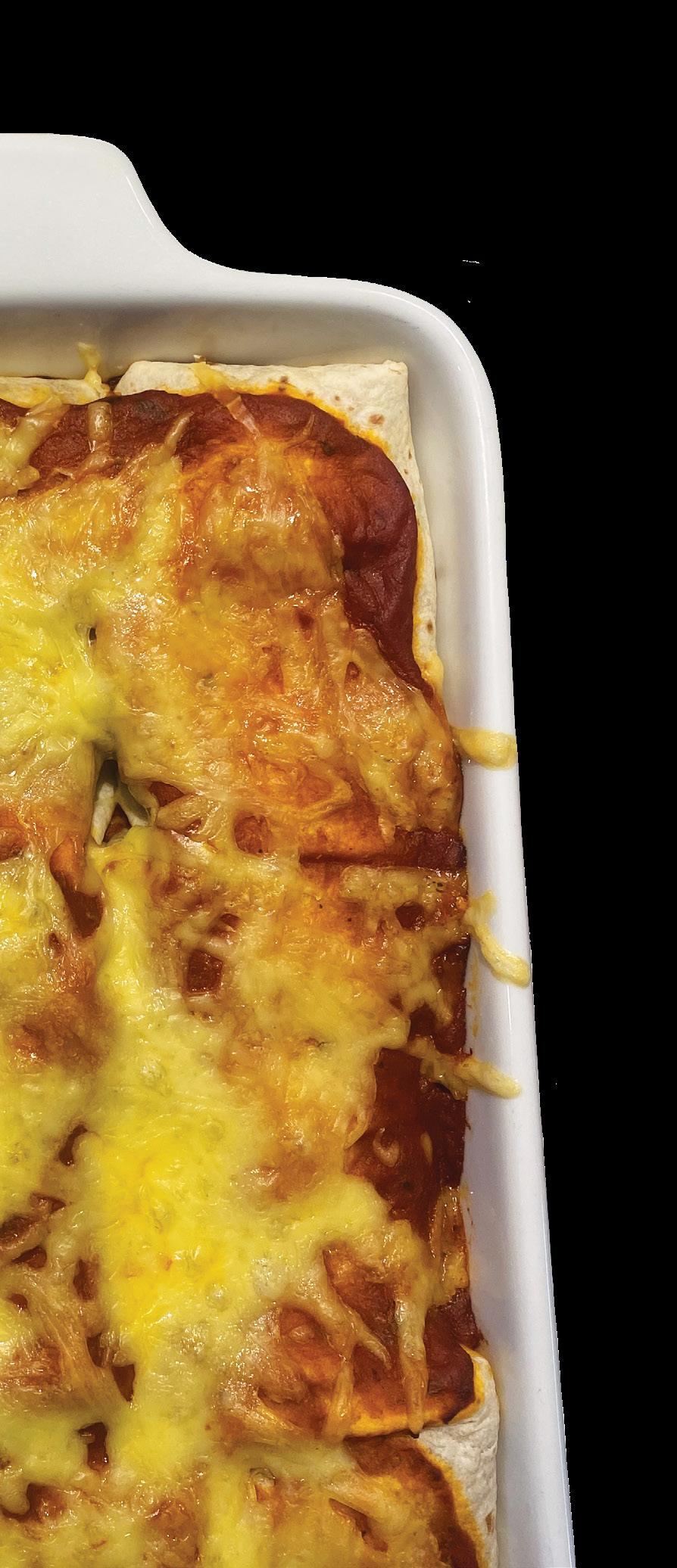
(optional: if you want to save yourself some steps or time, you can buy a premade enchilada sauce or salsa)
By Ruby Hudson
Note: You will probably leftovershave of the filling and sauce, so take this for lunch the next day or buy a few more wraps :)
the one preparedyouearlier any of the burrito/taco spice mixesseasoning is perfect
Begin by making the enchilada sauce. If you are not making your own sauce skip to making the filling in step 4 .
In a small pot, heat the ¼ cup of oil over medium heat. Once hot, stir in the flour until it has made a paste. Once combined, cook for 2 mins.
From here add in the rest of the sauce ingredients to the pot (tomato puree, water, oregano, cumin, coriander, paprika, garlic powder & sugar), whisk until combined with the flour paste. Turn the heat down to low, and let the sauce come to a simmer. Cook for 10 mins and then remove from heat and set aside.
Preheat your oven to 180 degrees. Now to make the
Grab a large pan and place over medium heat. Add in approx. 2 Tbsp of oil. Once the oil is hot, add in the onions, grated carrot and capsicum. Cook for 10 mins until
From here add in the garlic and corn, cook for a
After this add the black beans, can of tomatoes, enchilada sauce, taco seasoning mix, and a splash of water. Mix until combined and cook for 10 mins over low heat.
Now we are ready to assemble the enchiladas. Begin this by putting a thin layer of enchilada sauce into the bottom of a large ovenproof dish.
On a separate plate take a tortilla, put a small amount of cheese into the middle, and then put a decent spoonful of the filling mixture on top. Be careful you don’t over stuff them or they will be impossible to roll.
Roll the tortilla by pulling in both sides, to seal the ends, and then rolling into a burrito shape. Place into the pre-sauced dish and continue this until all the tortillas have
Once your dish is full, spread a decent layer of the sauce over the top of your rolled enchiladas, top with a generous layer of cheese, and then bake in the oven for 35
Once the cheese is bubbling and brown, and the tortillas are crispy, remove from the oven and enjoy served with sour cream and guac!
By
BY Gin Swigmore
A Gonster in its ideal state (ideal is used loosely here) looks like a slightly disturbing black and green traffic light drink, with the two substances separating like oil and water. Critic’s first attempt at making one didn’t go quite to plan; we weren’t able to get our grubby hands onto a Monster Nitro, so we had to settle for the original, which, a) wasn’t fluorescent green, and b) did not settle in layers.
6 Potatoes (medium size) (scribble: Choose a mix of what you like!)
Oil Salt Pepper
Fresh vegetables of your choosing to serve (e.g. lettuce, tomatoes, red onion, avo, pickles)
This resulted in a concoction of pure evil, a bubbling bog-water looking drink that was the physical manifestation of having to wait twenty minutes for your pint of Guinness to pour. We simultaneously felt like a victim and a perpetrator of crimes violating the Geneva Convention.
Burger “Patty”
1 onion (diced)
500 g Beef Mince or 400 g Lisa's Mediterranean Falafel Mix
1 tsp dijon mustard
1 tsp tomato sauce (scribble: Don’t include the T-sauce or mustard if you are going for the falafel version)
2 tsp garlic powder
1 tsp dried oregano
After a Gonster-fuelled interlude scouring Reddit on how to properly pour a Gonster, Critic’s second attempt left us tipping the remaining half of the Monster into a pint glass, before pouring the rest of the Guinness over a spoon against the wall of the glass to slow down the pour. We hoped this would make the elegant Guinness-on-top,
2 tsp paprika
1 tsp dried thyme
Burger Sauce
Monster-below segregation we saw on a shitty Instagram meme. This method also didn’t work. Now, half-pissed mid St Paddy’s Day with two glasses of bog-water, Critic decided the only real course of action was to sink both of these consecutively and hope for the best. Tasting like a shitty King’s Cup, the Gonster was essentially an overpowered Monster. The Guinness was really just an afterthought. The drink tasted like a Monster but with the unsettling consistency of some sort of milkshake. It’s enough to make you question whether you ever actually liked Guinness.
Pairs well with: Totally not manufacturing a famine and pretending it never happened X factor: A cardiologist's drink of choice.
Hangover depression level: 10/10. Stuck in perpetuity trying to pronounce Irish names. Niamh “Ni-am, Ni-omi, Ni-... Fuck”
Taste rating: 2/10. “Dennis, there’s some lovely filth down here”

Top of the morning to you students! I hope everyone had a great St. Patrick’s day filled with responsible alcohol consumption. I know you didn’t but there’s nothing I can really do about that.
I just wanted to put a couple of things on your radar that’s coming up in the next couple of weeks.
For OUSA, keep your eyes out for the Hyde St. Party lottery where you and your mates can be in to get tickets for Dunedin’s premier piss-up/street party. It’s a right of passage for Otago students, not that I’m trying to peer pressure you.
The Otago Students Relay for Life is coming up on the 29th-30th of March, which is a great opportunity to raise some money and otherwise support people struggling with cancer. We’ve got an OUSA team that you can donate to (please donate to me I need to beat Amy Martin). Or you can organise a team of your own either with your mates or in your clubs (tramping club, your whole thing is walking surely you get involved).
The Exec have a team on the go, locatable on the Relay for Life website under ‘OUSA Exec/Staff 2025’ and have committed to challenges over the course of the night depending on how much we raise:
Tutu Makeover at $1,000: The Exec will wear purple tutu’s for relay for life
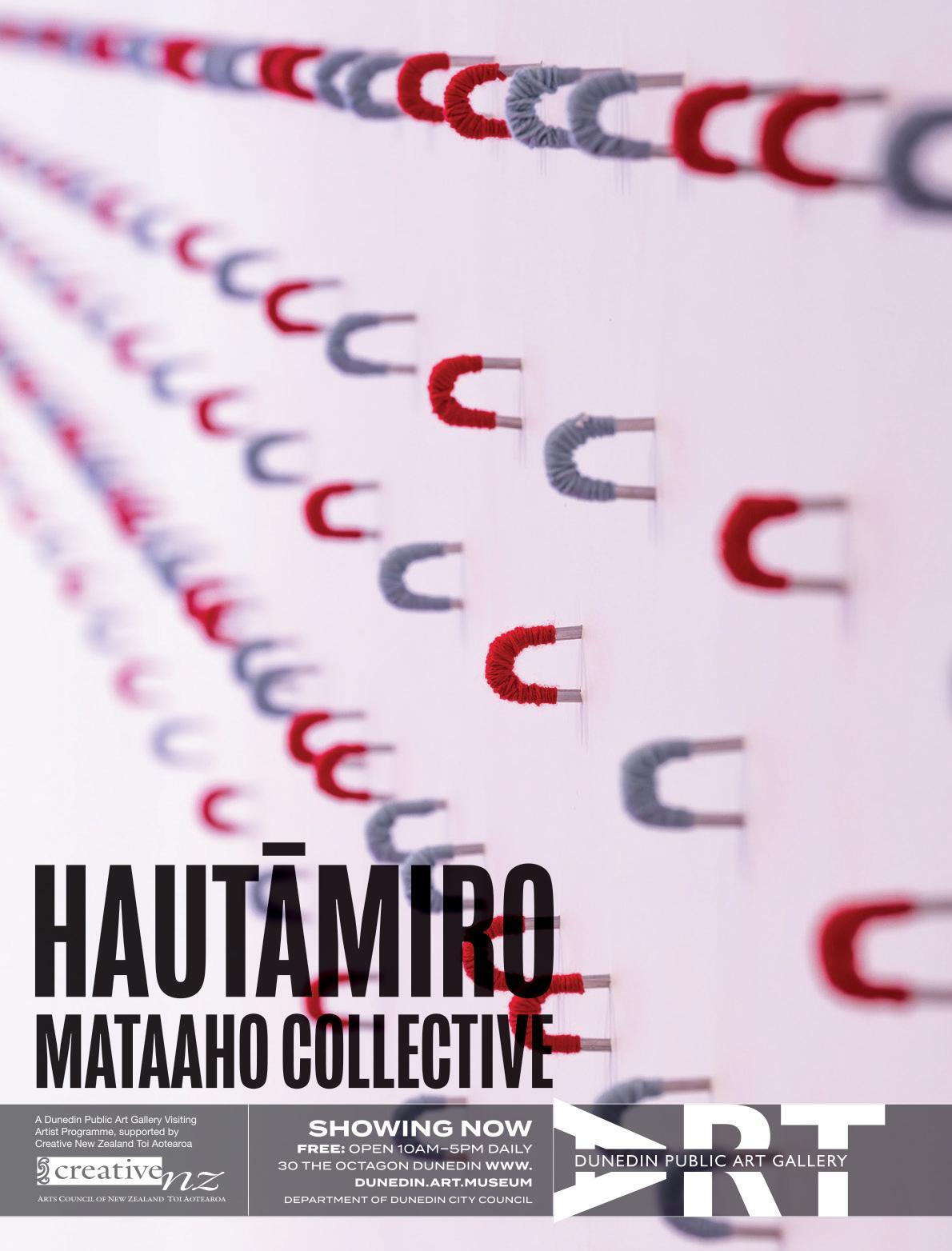
Pie Face at $2,000: The two highest donors get to smash a pie in the face of two exec members of their choice
Three-Legged Liability at $3,000: We’ll will do a 3-legged walk for an hour
Carrying the Team at $4,000: Exec will give each other piggybacks for 10 laps
Gore-athon at $5,000: Exec will walk the distance to Gore by the end of the night
Cancer Stinks at $6,000: Exec will carry around a purple toilet for an hour
Spicy Q&A at $7,000: Exec will eat a chilli and answer questions from students
Clowning Around at $8,000: Exec will wear clown make-up
Polar Pludge at $9,000: Exec will do a sunrise dip in full costume at the end of the night
Shotguns 4 Cancer $10,000: Exec will all shotgun a Blue V and the loser has to wear Daniel’s Highlanders onesie for the rest of the night
Mullet Mania $11,000: Liam will cut his hair to a mullet
Hair Today Gone Tomorrow at $12,000: Liam will shave his head
Liam White OUSA President

This week's weather will be your downfall. Make sure that the first thing you do in the morning is check the MetService app – no one wants to be the person who gets caught in the rain in a t-shirt or forgets to put a top under their hoodie on what feels like the hottest day ever.
Cartoon rec: Regular Show

Are you ready to start thinking about actually saving and not just being ok with the $200 dollars that sit in your account?
If you really want to have a Euro summer (the one you’ve been telling everyone who will listen) then you gotta start picking up some extra shifts or stop going through three vapes a week.
Cartoon rec: Paradise PD
We’ve been trying to reach you about your degree’s extended warranty… its time to join the long line at Ask Otago because something is seriously fucked up in your eVision applications.
Cartoon rec: Solar Opposites
You have a sore joint from an unfortunate St Paddy's day accident that could use a check up from someone more qualified than your SPEX flatmate. Have to make sure you're fit and able to bust down on the floor at Catacombs’ next big event.
Cartoon rec: Gravity Falls
As a Sagittarius you have the most creative ways of getting out of having to socialise with your friends but it's time to stop cancelling last minute and to start going out because you’re only young for a short amount of time and it's honestly kinda scary to be the old guy in a club.
Cartoon rec: Arcane
Have you spoken to your parents much this month? They miss you and just want to hear the lies that you have been learning heaps and not drinking too much. Remember that to make them think you’re not a boring fuck, just throw in your most tame story about a friend on the piss.
Cartoon rec: American Dad
Okay so here's the real talk: just because you're a Scorpio and being a bitch comes easily, that doesn't give you an excuse to be the biggest cunt in the room all the time. So this week why don’t you surprise someone by being nice?
Cartoon rec: The Simpsons
Your bedsheets are crying out to be washed. The coffee and food stains are not pretty and if you actually ever want someone of your desired sex to wanna come and get down and dirty, then you really gotta step up your room cleaning game!
Cartoon rec: BoJack Horseman
This week's lectures are going to be very important for the upcoming assignments so try to stay locked into what the lecturers are talking about and not be watching a basketball game or playing Wordle.
Cartoon rec: Invincible
This week you will bring shame to your whole flat by getting UberEats from a restaurant that is within 500m of your flat. Don't worry, we have all done it – but just don't tell anyone aye.
Cartoon rec: Big Mouth
When ordering your daily coffee, get a large and maybe add an extra shot. This weeks going to be rough and you certainly will not be getting enough sleep to power you through it so caffeine will be your best friend.
Cartoon rec: Adventure Time
This week you will meet your twin. Not literally but you will meet someone who will, in a sense, complete you. They will encourage all your bad ideas and you will often run into them on campus wearing suspiciously similar outfits.
Cartoon rec: Rick and Morty

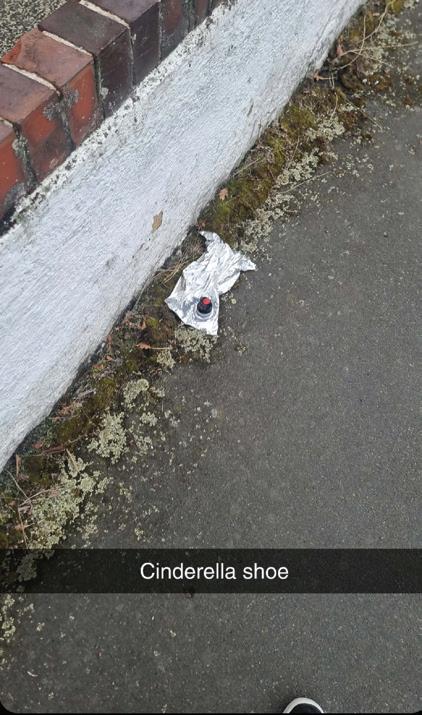
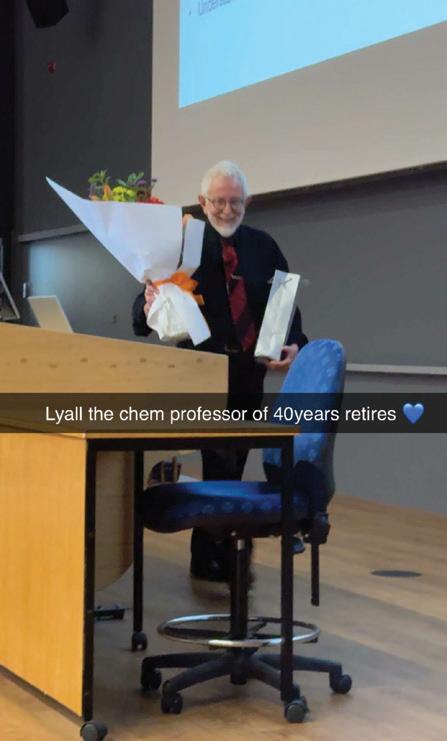

SEND A SNAP TO US AT @CRITICMAG BEST SNAP EACH WEEKS WINS AN OUSA CLUBS & SOCS SAUNA VOUCHER
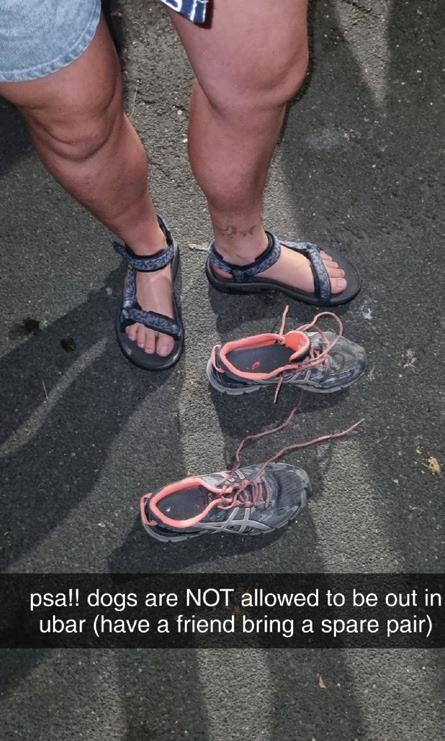

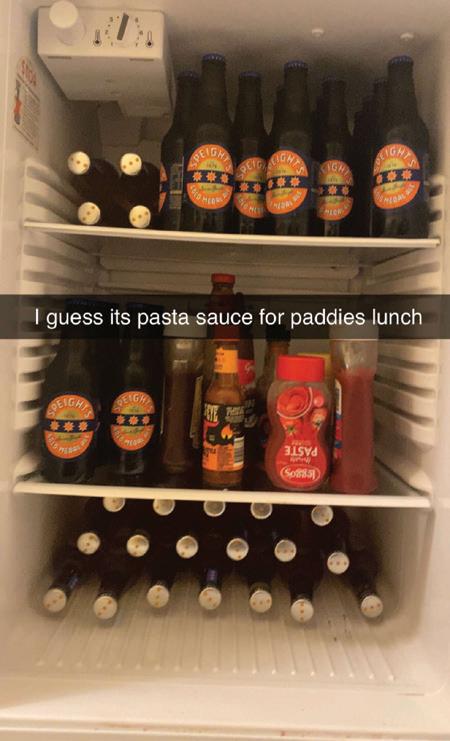
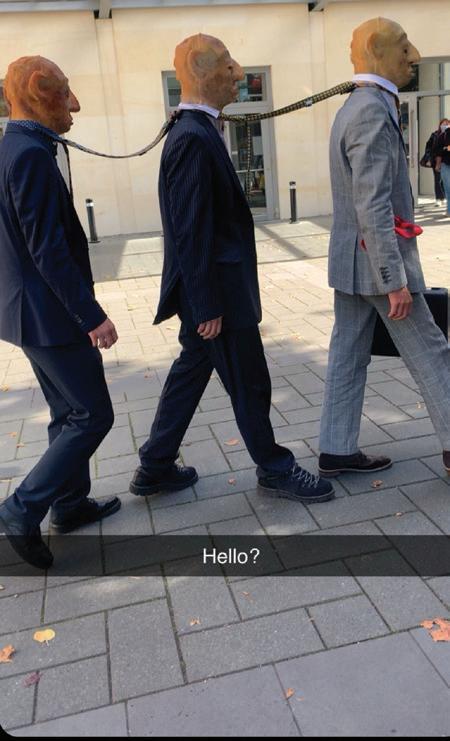
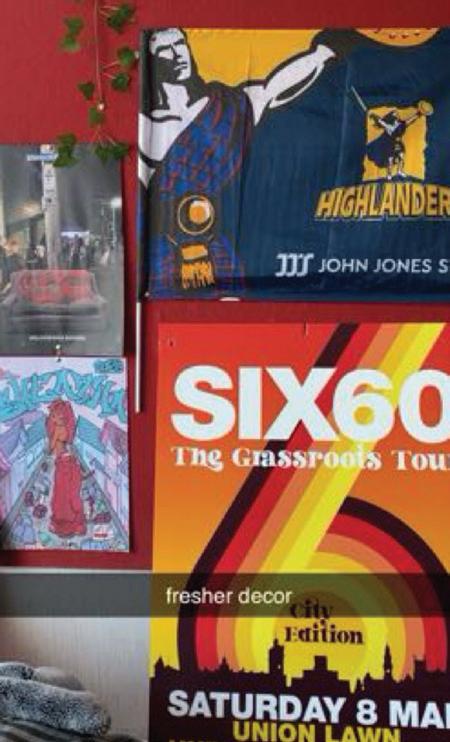
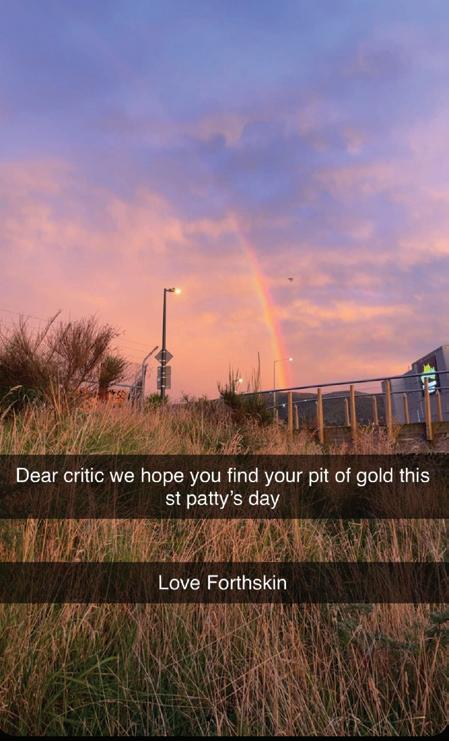
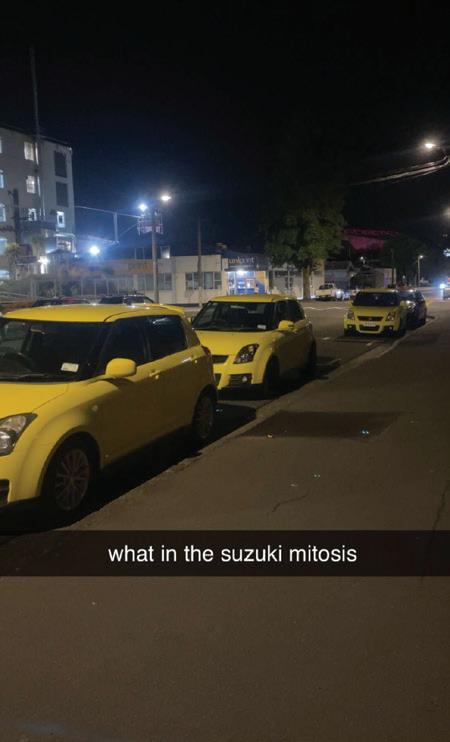
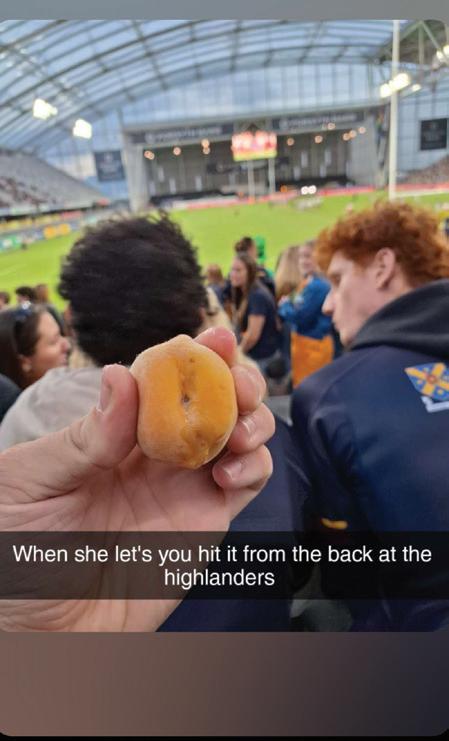
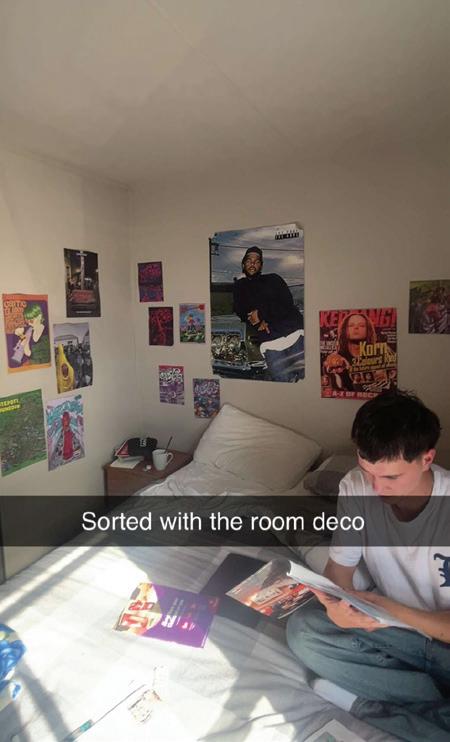
To commemorate 100 years of Critic, we're proud to announce a book proposal!

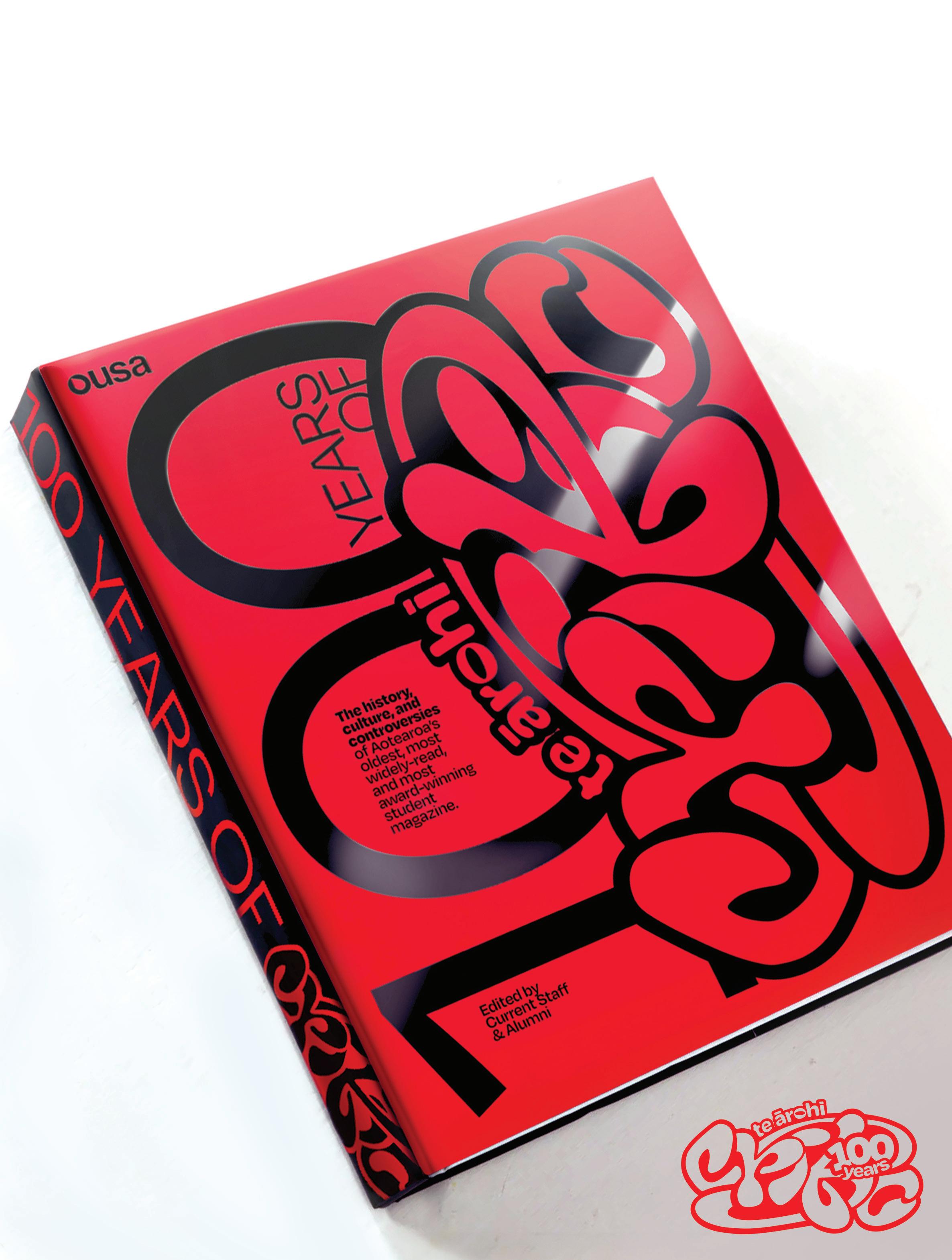
A centenary only happens once, and we need your help to make this project happen. Scan the QR code to check out the book proposal and details for pledges and donations
